#patroclus and achilles i do love you forever
Text
PAC How Will Your Future Spouse View You

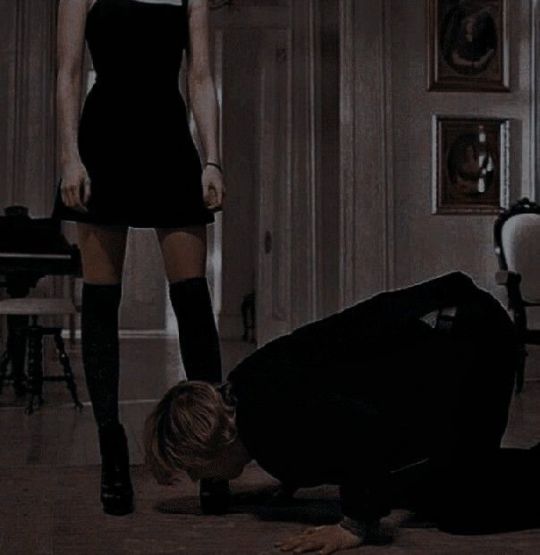

Pile 1 Pile 2 Pile 3
DISCLAIMER THIS IS A GENERAL READING TAKE WHAT RESONATES AND LEAVE WHAT DOESN'T.
Strictly for entertainment purposes.
PILE 1
So, before I get into the tarot bit of the reading the overall vibe I am getting is that you and your future spouse will be that couple that are still doing cute stuff together even in old age. You know those older couples you see on TikTok on dates still happy and very much in love, yeah like that. One word I can use to describe it is cozy, just very warm and affectionate basically feeling like this person is your home. It's going to be like 'I'd rather come home to you then be anywhere else'.
On to the tarot bit, Your FS sees you as someone very confident and optimistic (even if you don't see yourself that way). They see you as being positive and very wholesome. Again, before I pulled cards I channelled and I still got the warmth.
Oh my gosh, if any of you have read The Song of Achilles that's basically it. Before anyone points out to me they were a same sex couple .Yes, I know but I am talking about the relationship dynamic between Patroclus and Achilles.
You may have gone through a difficult time in your life and your future spouse will admire how strong and resilient you are, how you're able to adapt to challenges and changes in environment. You may be the type of person who is connected to both their divine feminine and masculine and they truly find that attractive.
They certainly view you as their other half and I know its cliche to say soulmate but that's all your future spouse is saying. You just give them so much happiness and emotional fulfilment.
'They are my home, my soulmate, my forever'
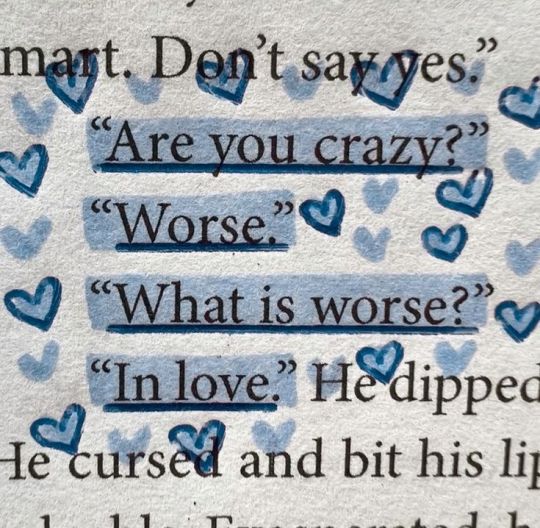


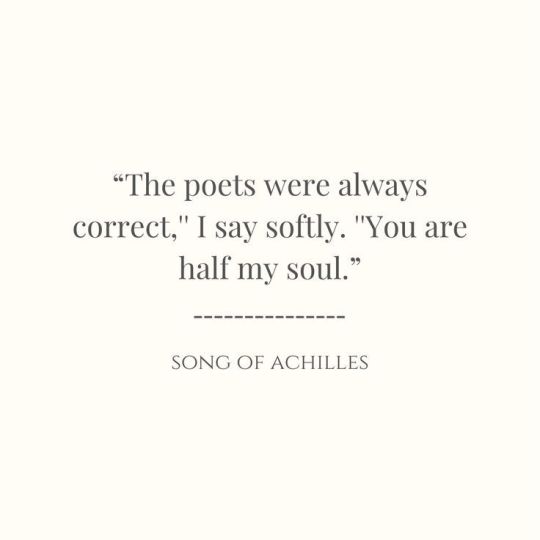
PILE 2
Ugh Pile 2 your spouse will literally worship you😩. Like you'll tell them your insecurities and they'll just sit there kissing every scar, mark, dimple anything you're insecure about they'll adore. If you're a female or a feminine reading this and you have thick thighs I heard them say 'Come here and crush my skull with those sexy thighs'. Whoever you are you have someone's poor child down horrendous for you.
I think they may be the type to just watch your social media whether you are getting to know each other, dating, engaged or married your social media pages, pictures and videos will always be on their phone screen and they won't go to sleep without listening to a little voice message you sent. Once they get attached baby there's absolutely no getting rid of them, I heard 'You'll have an easier time getting rid of bed bugs'.
When you meet them, they may be a party animal or a player.
Disclaimer it's not toxic obsession more like they will let you be your own person but at the end of the day they are yours and you are theirs, you are their spouse, and they are your spouse and they will forever put you on a pedestal not to the open where they will neglect themselves.
They see you as a prize (again not in a creepy way) You may have options when you meet this person but best believe they'll make sure to stand out and win you over. They see you as the best the world has to offer in terms of what a wife/husband/spouse should be. Your person may have had a few letdowns when it came to love and just know that they see you as a dream come true and again, I know that's very cliche but trust me when Isay they view having you as a spouse as their biggest accomplishment and they want you to know that they'll prove to you every day they are worthy to call themselves your spouse. They feel like you have gone through a period of depression and sadness, and they want you to know that they acknowledge it and they see you as strong every day.
The couple I channelled for you guys is Queen Charlotte and King George from Bridgerton.
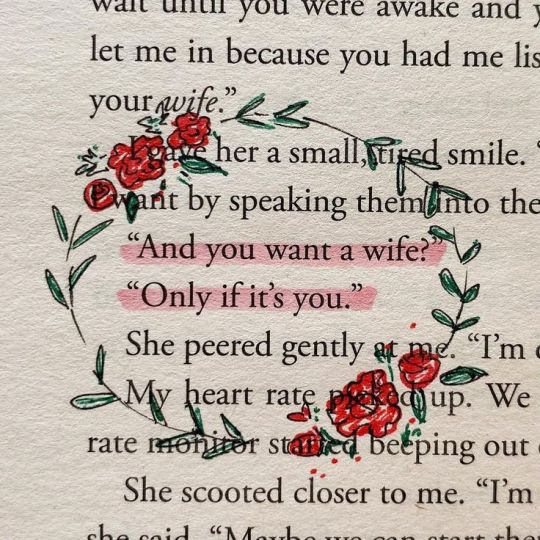
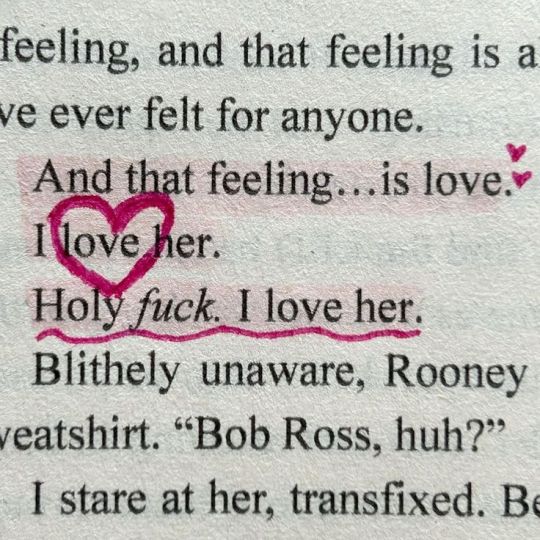
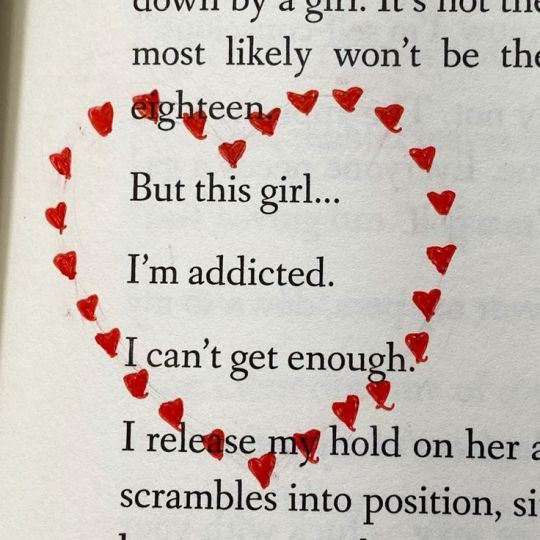
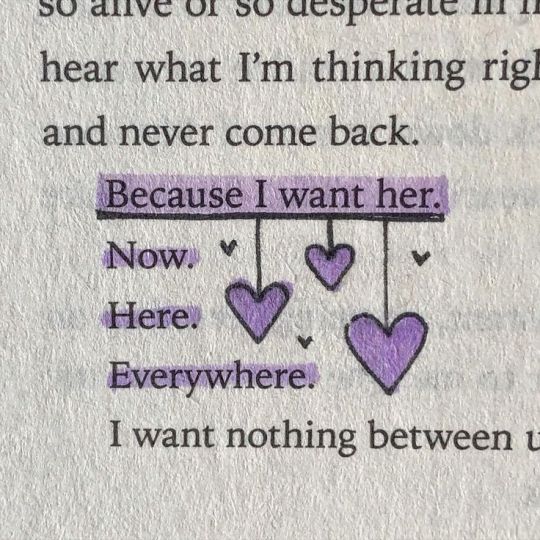
PILE 3
First thing I heard 'Sugar Daddy'. This person will spoil you but love you even more. Yes, they may have money and give you gifts but this person truly does love you, care about you and respect you.
They may be older than you that's why people may think that they are your glucose guardian which is not technically wrong and not technically correct either. I feel like that will be a long term joke you two have about them being your sucrose supplier..
They will definitely view you as delicate, I want to say that they are the protective type but not protective to the point of you feeling suffocated by them. They want you to be comfortable and have what you like 'If my spouse wants that watch I'll get it for them'.
They will view you as fun loving, yet you have this air of power to you that they love. Sure, they view you as delicate and they want to protect you, but they also view you as strong and beyond capable of taking care of yourself and those around you basically your spouse is saying 'they want me, but they don't need me'. They know that you can walk away from them anytime and they like that you're always in your power no matter what.
Your spouse admires how you don't need them to feel whole or for financial gain they see you as a breath of fresh air, a change of pace, an adventure.
He may touch you a lot with your consent obviously, like a hand on your waist, shoulder or they may steal little quick kisses. Also, there may be a lot of friendly banter in the relationship.
The couple I channel for you guys is Fallon and Liam from Dynasty.

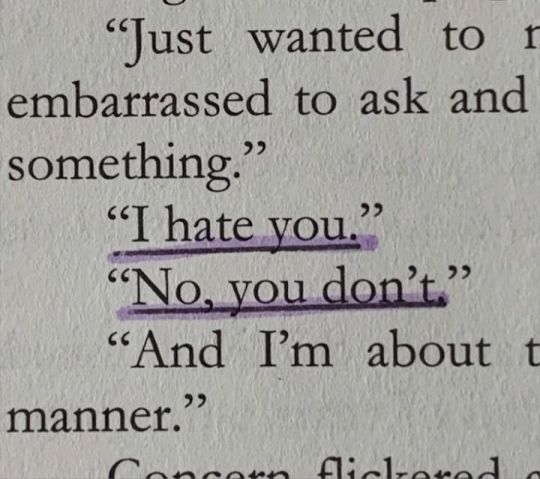
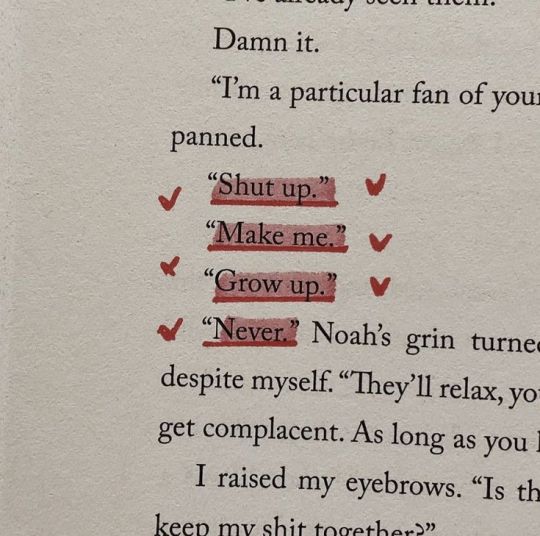
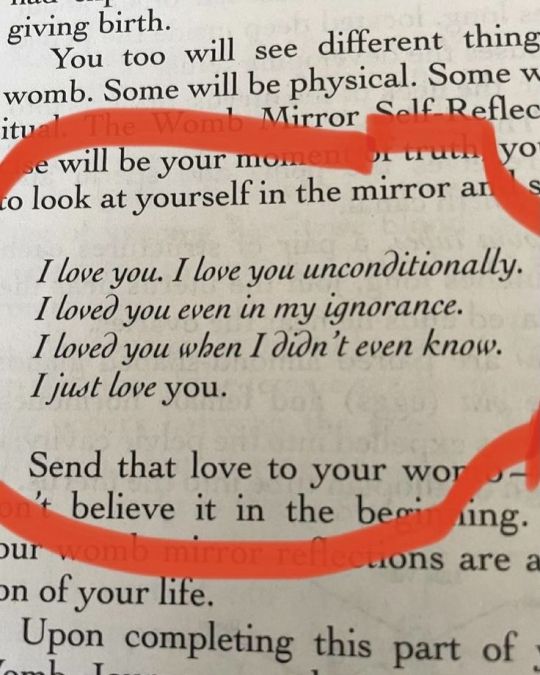
#free tarot reading#pick a pile#pick a card#future spouse#tarot reading#tarotcommunity#tarotblr#tarot cards#daily tarot#love tarot reading#love tarot free#pagan#paganblr#hellenic pagan#Spotify
656 notes
·
View notes
Text
just finished the song of Achilles btw I liked it generally speaking but by the way people spoke of it I really thought it would be more compelling and perhaps poetic.
#my things#perhaps it was lacking or perhaps im overly critical#patroclus and achilles i do love you forever#maybe ill read the illiad one day for better comparison#ok to be fair the last book i read was dracula and everyone in that thing is so long winded about everything so im still reeling from it
8 notes
·
View notes
Note
although my first request was achilles idk much about patroclus. you said he's one of your favorites so you know other ancient texts that mention him besides homer?
IT TOOK SOME TIME, BUT HERE IS YOUR PATROPEDIA!!!
Hey! Patroclus doesn't have AS MUCH lore as some other mythological characters, but there's still enough for this post to be long, so get ready! Fortunately, it's divided into topics, so it should make it easier to read with pauses.
And some details:
Since you said "ancient texts", I'm assuming non-mythological texts count and I'm going to put them here.
My focus is on Greek texts because I don't know much about non-Greek sources, but there are some non-Greek texts here.I’ill indicate which are the non-Greek ones so that no one confuses them with the Greek texts. As I'm already considering texts from the Archaic, Classical and Roman Greece, I'll consider Byzantine sources as well. So be aware that some of these texts have a considerable amount of time in between.
It's also important to say that I'm only including the ones that >>I<< know Patroclus is in, there may be others! And I'm not a classicist or anything like that, any part here that is my interpretation (it will be very obvious when it is) is...just an interpretation of an ordinary person. It is not a super historical, contextual analysis, etc. For the love of god, don't think you have to agree!
The links go to the exact points I mentioned,so it’s easier for you to check.
Check the "References" part in the end!
My English can be broken, especially in such a long text.

FAMILY
Father: Menoetius
From what I've seen, Menoetius being Patroclus' father is a constant characteristic of his character. Now, just to clarify some ideas:
"Patroclus is the son of a titan"
I've heard this one, but guys…he's not! It's just that there's a titan named Menoetius, but it's NOT the same Menoetius. Patroclus' paternal grandfather is Actor, and this titan's father is Iapetus and not Actor.
[...]And Actor's son Menoetius[...]
The Iliad, XI, 938. Translation by Robert Fagles.
Now Iapetus took to wife the neat-ankled maid Clymene,
daughter of Ocean, and went up with her into one bed.
And she bore him a stout-hearted son, Atlas:
also she bore very glorious Menoetius [...]
Theogony, 507-510. Translation by Hugh G. Evelyn-White.
"Patroclus' father was an Argonaut"
That's right! There is indeed a Menoetius son of Actor from Opus among the Argonauts.
Moreover Actor sent his son Menoetius from Opus that he might accompany the chiefs
Argonautica, 69. Translation by Seaton, R. C.
"Patroclus' father is the brother of Achilles' father, Peleus"
This wasn't invented! There are fragments attributed to Hesiod, and fragment 61 is a commentary by a scholiast of Homer named Eustathius mentioning a Hesiodic tradition in which Menoetius and Peleus are brothers.
Eustathius, Hom. 112. 44 sq:
It should be observed that the ancient narrative hands down the account that Patroclus was even a kinsman of Achilles; for Hesiod says that Menoethius the father of Patroclus, was a brother of Peleus, so that in that case they were first cousins.
Catalogue of Women, frag 61. Translation by Evelyn-White, H G
Mother: Sthenele, Periopis, Polymele, Democrateia, Philomela
Patroclus' mother is not a fixed tradition, her identify changes depending on the source.
Achilles was also accompanied by Patroclus, son of Menoetius and Sthenele, daughter of Acastus; or the mother of Patroclus was Periopis, daughter of Pheres, or, as Philocrates says, she was Polymele, daughter of Peleus.
Library, 3.13.8. Translation by James George Frazer.
If we consider Philocrates' version, then Patroclus' mother is Achilles' sister, which makes Achilles Patroclus' uncle. This makes me think that Philocrates probably didn't follow the Hesiodic tradition of Menoetius and Peleus being brothers, or Menoetius would be marrying his niece. But who knows, after all Arete and Alcinous in The Odyssey are married and they're niece and uncle. Or it could be another Peleus, though I have never seen that name on another character before.
Damocrateia was also attributed as his mother by a scholiast of Pindar in the Olympian Odes. And here is the moment when you expect me to post another excerpt in English, but that won't happen because I simply DIDN'T find it in English! But I found it in Greek and, activating Google Translate, the translation comes out completely messed up, but you can see that the information is really there and wasn't invented by Wikipedia! And if you use a translation website, it's less confusing to read but it's definitely not 100% accurate yet.
Anyway, it’s in poem 9 scholia. From what I understand, it’s basically telling about the nymph Aegina, daughter of the river Asopus. She first gave birth to Aeacus (son of Zeus), who is the father of Peleus and Telamon (Telamon is the father of Great Ajax and Teucer). She subsequently went to Thessaly, where she had a relationship with Actor and gave birth to Menoetius. Menoetius settled in Opus and had Patroclus with Sthenele or with Damocrateia. The part mentioning Democrateia is more specifically poem 9.106.b! In 9.104.a, it's said that Democrateia is also Aegina's daughter, so basically in this version Patroclus is a child of half-sibling incest. As Aegina is the mother of Aeacus, who is the father of Peleus, who is the father of Achilles, Achilles and Patroclus are cousins once removed.
There is also Philomela, mentioned by Homer's scholiasts in 343 and 134 (both in Greek). There was no translator that could save me, so I had to ask for help from someone who understands Greek and, apparently, the scholiasts weren’t sure whether or not she could be considered Patroclus' mother. It wasn’t really a statement like in other cases.
Sister: Myrto
There is a daughter of Menoetius and therefore sister of Patroclus named Myrto. In this version given by Plutarch, she had a daughter with Heracles named Eucleia. This makes Patroclus a kind of brother-in-law of Heracles.
Now Eucleia is regarded by most as Artemis, and is so addressed; but some say she was a daughter of Heracles and of that Myrto who was daughter of Menoetius and sister of Patroclus, and that, dying in virginity, she received divine honors among the Boeotians and Locrians. For she has an altar and an image built in every market place, and receives preliminary sacrifices from would-be brides and bridegrooms.
Aristides, 20.6. Translation by Bernadotte Perrin.
I only found this mention of her as Patroclus's sister.
Brother: Abderos
The version of Abderos, one of the characters considered between the lovers of Heracles, being the brother of Patroclus is found in Photius' Bibliotheca. This Bibliotheca is Photius giving reviews of the books he has read, so this version isn't his, but rather the person he's evaluating. In this case, he attributed this myth to Ptolemy Hephaestion's New Histories (because of a passage in the Suda, there is a theory that this Ptolemy is Ptolemy Chennus. In this case, Ptolemy Chennus is from Roman Greece. So although Photius is Byzantine, the version isn’t from Byzantine Greece). Again, Patroclus is a sort of brother-in-law of Heracles.
The centaurs who fled from Heracles through Tyrsenia perished of hunger, ensnared by the soft song of the Sirens. Abderos, who was loved by Heracles, was the brother of Patroclus [...]
Photius' Bibliotheca, 190.39. Translation by Roger Pearse.
I only found this mention of his as Patroclus's brother. And in case you read the part where I say it's a review and wondered what Photius' opinion was on Ptolemy's versions... well, he wrote “a work really useful for those who undertake to attempt erudition in history; it can, in fact, give the method to know in a short time connected elements, whereas a long life would be consumed in the effort of locating them in the books through which they are scattered. It abounds in extraordinary and badly imagined information; and the peak of absurdity is that he attempts, for certain trivial fables, to explain the reasons for their appearance.”
My take
Although the fragment attributed to Hesiod establishes Menoetius and Peleus as brothers, the other sources don’t seem to make this connection between them. Peleus 99% of the time isn’t Menoetius' brother, but Telamon's (and Phocus' half-brother by Aeacus). On the other hand, Actor appears to mostly have children with Aegina, Menoetius being one of them. So I think it's more likely that the most popular version would be that Patroclus entered Aegina's lineage as Achilles' cousin once removed, rather than first cousin. Patroclus' siblings are only mentioned in much later sources, which leads me to believe that they’re a more recent version of the myths and perhaps in older versions he was an only child or his siblings didn’t have important myths. As for Patroclus' mother, it’s impossible to deduce anything besides Philomela seems to have been the only possible mother to be cited with doubt by scholiasts.
As I can't be sure of Patroclus' most popular attributed mother (although I theorize that perhaps it could be Sthenele since she was the only one I saw mentioned in two different sources), I won't do his maternal lineage or it would take too long. But, by his father's side, Actor is apparently the son of Myrmidon and Pisidice and has a brother named Antiphus.
[...] and Pisidice had Antiphus and Actor by Myrmidon.
Library, 1.7.3. Translation by Sir James George Frazer.
However, there are surprisingly a fair amount of “Actor” in the mythology, so while being descended from Myrmidon fits in with Patroclus becoming a Myrmidon, I'm not sure if we're talking about Patroclus' Actor or someone else. Although Menoetius is king of Opus, his family doesn’t originate from Opus according to Pindar.
[...] until the ruler of Olympus carried off the daughter of Opus from the land of the Epeians, and lay with her peacefully in the glens of Mount Maenalus, and brought her to Locrus, so that age would not overtake him and lay the burden of childlessness on him. His bride was carrying in her womb the seed of the greatest god, and the hero rejoiced to see his adopted son, and gave him the same name as his mother's father, Opus, a man beyond words in beauty and fine deeds. Locrus gave him a city and a people to govern, and strangers came to him from Argos and Thebes, from Arcadia and Pisa. But among the settlers he chiefly honored the son of Actor and Aegina, Menoetius [...]
Olympian Ode 9. Translation by Diane Arnson Svarlien.

PRE-TROY
As a child, Patroclus killed another boy and, as a result, was sent to Phthia, where he met Achilles. Sources we have regarding this are:
"[...] just as we grew up together in your house,
after Menoetius brought me there from Opois,
and only a boy, but banished for bloody murder the day I killed Amphidarnas' son. I was a fool —
I never meant to kill him — quarreling over a dice game. Then the famous horseman Peleus took me into his halls,
he reared me with kindness, appointed me your aide. [...]"
The Iliad, XXIII, 102-108. Translation by Robert Fagles.
[...] At Opus, in a quarrel over a game of dice, Patroclus killed the boy Clitonymus, son of Amphidamas, and flying with his father he dwelt at the house of Peleus and became a minion of Achilles.
Library, 3.13.8. Translation by Sir James George Frazer.
I haven't found any other version that explains why he met Achilles other than being exiled to Phitia, so I imagine it's constant in Patroclus myths.
Patroclus is mentioned among Helen's suitors by Pseudo-Apollodorus.
Now the kings of Greece repaired to Sparta to win the hand of Helen. The wooers were these: -- Ulysses, son of Laertes; Diomedes, son of Tydeus; Antilochus, son of Nestor; Agapenor, son of Ancaeus; Sthenelus, son of Capaneus; Amphimachus, son of Cteatus; Thalpius, son of Eurytus; Meges, son of Phyleus; Amphilochus, son of Amphiaraus; Menestheus, son of Peteos; Schedius and Epistrophus, sons of Iphitus; Polyxenus, son of Agasthenes; Peneleos, son of Hippalcimus; Leitus, son of Alector; Ajax, son of Oileus; Ascalaphus and Ialmenus, sons of Ares; Elephenor, son of Chalcodon; Eumelus, son of Admetus; Polypoetes, son of Perithous; Leonteus, son of Coronus; Podalirius and Machaon, sons of Aesculapius; Philoctetes, son of Poeas; Eurypylus, son of Evaemon; Protesilaus, son of Iphiclus; Menelaus, son of Atreus; Ajax and Teucer, sons of Telamon; Patroclus, son of Menoetius.
Library, 3.10.8. Translation by Sir James George Frazer.
And by Pausanias:
At a spot called Arainus is the tomb of Las with a statue upon it. The natives say that Las was their founder and was killed by Achilles, and that Achilles put in to their country to ask the hand of Helen of Tyndareus. In point of fact it was Patroclus who killed Las, for it was he who was Helen's suitor. We need not regard it as a proof that Achilles did not ask for Helen because he is not mentioned in the Catalogue of Women as one of her suitors.
Description of Greece, 3.24.10. Translation by W.H.S. Jones.
Although Hyginus isn’t Greek, Fabulae (attributed to him) was intended to collect Greek myths and present them to a Roman audience — that's why the Latin names. So I’ll be considering it here as a source of Greek myths.
SUITORS OF HELEN: Antilochus, Ascalaphus, Ajax, son of Oileus, Amphimachus, [Ancaeus], Blanirus, Agapenor, Ajax, son of Telamon, Clytius the Cyanean, Menelaus, Patroclus, Diomedes, Peneleus, Phemius, Nireus, Polypoetes, Elephenor, Eumelus, Sthenelus, Tlepolemus, Protesilaus, Podalirius, Eurypylus, Idomeneus, Leonteus, Thalpius, Polyxenus, Prothous, Menestheus, Machaon, Thoas, Ulysses, Phidippus, Meriones, Meges, Philoctetes. Older writers mention others.
Fabulae, 81. Translation by Mary Grant.
Chronologically, Patroclus wouldn’t have been old enough to become Helen's husband (he would be at least 7/8 years old and at most just over 10). I really don't know if it's a case of myths contradicting each other in chronology or if perhaps the intention was to achieve an engagement rather than a direct marriage or even a connection (Odysseus himself was among the suitors, but focused on Tyndareus and Penelope rather than Helen). This version doesn’t seem to be a case of more isolated myth like Menoetius and Peleus being brothers. I also imagine it happened before Patroclus was sent to Phitia.
Although people consider Patroclus training at Pelion, there are no Greek sources that show him there, only Roman ones. I imagine that Patroclus' current association with Chiron is to make sense chronologically that he grew up with Achilles, since Achilles in most sources spent a considerable portion of his childhood with Chiron. In this post I exemplify this better.
As for Patroclus going to Troy, we have:
“[...] And your fathers filled your ears with marching orders.
The old horseman Peleus urging his son Achilles,
'Now always be the best, my boy, the bravest,
and hold your head up high above the others:
And Actor's son Menoetius urging you, 'My child,
Achilles is nobler than you with his immortal blood
but you are older. He has more power than you, by far,
but give him sound advice, guide him, even in battle.
Achilles will listen to you-for his own good:
So the old man told you. You've forgotten. [...]”
The Iliad, XI, 934-943. Translation by Robert Fagles.
Here it seems that the reason, or at least the main reason, Patroclus was in Troy is because Peleus wanted him to be with Achilles.
[...] And in that way Achilles went to Troy. [...] Achilles was also accompanied by Patroclus, son of Menoetius [...]
Library, 3.13.8. Translation by J. G. Frazer.
Once again it appears that Patroclus went to Troy as Achilles' companion.
He’s usually described as going to Troy accompanying Achilles. The character of Patroclus actually seems strongly linked to going to Troy, since in some versions he’s one of the suitors and therefore took the oath. And even if we consider authors who didn’t mention Oath of Tyndareus, Patroclus follows Achilles. It's as if there was an effort to avoid the possibility of Patroclus not having gone to Troy, which makes sense because his character is essential to the development of the tenth year of war. Bro was reaaaaaally doomed by narrative lol

PERSONALITY, ROLE AND CHARACTER
Note: most of the things I wrote are more on the objective side, but this is the most subjective part of the post. So, of course, it's perfectly possible for you to disagree.
The uncommon “gentle” epithet
Patroclus was portrayed as gentle by Homer. He may not be what we see as "gentle" today because a soldier isn't exactly the picture of gentleness in modern times, but by the standards of the time and even among Homeric characters, Patroclus was considered gentle. It isn't a modern invention, as some people think.
When Menelaus announces the death of Patroclus, this is how he describes him:
[...] So here Menelaus paused
with much to command Meriones and the Aeantes:
"Ajax and Ajax, captains of Achaea, Meriones too,
remember Patroclus now, our stricken comrade!
That gentle man, the soul of kindness to all
while the man was still alive...
Now death and fate have got him in their grip."
The Iliad, XVII, 751-757. Translation by Robert Fagles.
When thinking about the fate of mortals, this is how Zeus describes Patroclus:
Now,
when Zeus who arrays the clouds saw Hector from afar,
strapping on the gear of Peleus' godlike son,
he shook his head and addressed his own deep heart:
"Poor soldier. Never a thought of death weighs down
your spirit now, yet death is right beside you ...
You don the deathless arms of a great fighterand all other fighters tremble before him, true,
but you, you killed his comrade, gentle, strong,
and against all rights you ripped the immortal armor
off his head and shoulders. So great power for the moment
I will grant you to compensate for all that is to come:
never again will you return from battle, Hector,
nor will Andromache take that famous armor.
Achilles' deathless armor, from your hands."
The Iliad, XVII, 227-239.
When mourning the death of Patroclus, Briseis said:
[...] So now I mourn your death — I will never stop —
you were always kind."
The Iliad, XIX, 355.
One of Priam's sons, Lycaon, when begging to be spared by Achilles appeals to the memory of Patroclus and describes him thus:
[...] Listen, this too-take it to heart, I beg you
don't kill me! I'm not from the same womb as Hector,
Hector who killed your friend, your strong, gentle friend!"
The Iliad, XXI, 107-109.
Note: In The Iliad, it's said that this Lycaon had been defeated before, but wasn't killed by Achilles because he was sold. In frag 1 of Cypria, it's said that Patroclus was the one who sold Lycaon in Lemnos. If we consider the possibility that it was the same in the Homeric tradition, it makes even more sense that Lycaon tried this strategy.
And Achilles:
"[...] But I and our fast stallions will not race today,
so strong his fame, the charioteer they've lost,
so kind — always washing them down with fresh water,
sleeking their long manes with smooth olive oil. [...]"
The Iliad, XXIII, 320-322.
Besides Achilles, Menelaus, Trojans (Briseis and Lycaon) and a god (Zeus) related Patroclus to kindness.
In The Iliad, the heroes generally have epithets that refer to:
Their appearance (ex: Menelaus with “xanthus/blonde/red-haired” and Ajax with “giant/gigantic”)
Their abilities (ex: Achilles with “swift-footed” as an example of physical ability and Odysseus with “tactician” as an example of intellectual ability)
Their role (ex: Agamemnon with "lord of men/shepherd of people" because he’s the leader of the Achaean army)
Their ancestrality (ex: Diomedes with "Tydeus' son")
They’re all epithets that somehow magnify them in war. They're big, they're fast, they have an important lineage, they play a big role. Patroclus has epithets like these too. He is "dear to Zeus", he is "Menoetius' son", he is "great-hearted". And yet he’s the only one who has the epithet "gentle". Everyone who receives personality-related epithets still receives warrior or strategic/wisdom epithets, but Patroclus also receives “gentle”.
Homer intentionally emphasized this characteristic of Patroclus and never treated it as a weakness, but rather as a quality. Gentle or kind only appears describing Patroclus after his death, as if these two things were linked (Menelaus and Briseis feel affected by Patroclus' death because he was kind to them, Zeus talks about how Hector is destined to die for having killed Patroclus while associating Patroclus with kindness and strength, Lycaon tries to win Achilles' mercy by remembering that Patroclus was kind, Achilles speaks of his horses' grief at losing a kind charioteer). The preserved memory of Patroclus by those who mourn or speak of his death is not just his strength or his courage, but his gentleness. This makes me think that the choice to make Patroclus the only hero to receive this type of epithet is precisely to aggravate the tragedy of his destiny — Achilles was the most affected, but he wasn’t the only one to mourn between the characters and even the listener/reader.
Impact of Patroclus' death and his relationships
Although there is the joke of Menelaus and Ajax recovering Patroclus' body for Achilles' sake (because of Menelaus' lines in XVII, 100-120, mainly "and haul the body back to Achilles — somehow. Things are bad, but that would be the best"), Menelaus actually demonstrated a strong protective reaction toward Patroclus' body before he thought of Achilles.
But Atreus' son the fighting Menelaus marked it all—
the Trojans killing Patroclus there in the brutal carnage—
and crested now in his gleaming bronze gear Atrides
plowed through the front to stand astride the body,
braced like a mother cow lowing over a calf,
her first-born, first labor-pangs she'd felt.
So the red-haired captain bestrode Patroclus now,
shielding his corpse with spear and round buckler,
burning to kill off any man who met him face-to-face.
But Euphorbus who hurled the lethal ashen spear
would not neglect his kill, Patroclus' handsome body,
The Iliad, XVII, 1-11.
Menelaus even fears that he would be left behind and die, but he still doesn’t abandon Patroclus and gets help. The Trojans' plan was to recover Patroclus' body and give it to Hector, who wished to depreciate his body by feeding it to dogs. If this happened, Patroclus wouldn’t have a dignified burial, something that is already important in modern culture, but in this specific context it would also prevent Patroclus from having adequate rest after death. Ensuring proper burial was VERY important, which is why it's impactful when one character tries to stop another from having it (like Hector wanted to stop Patroclus’ burial, Clytemnestra wanted to stop Agamemnon and Cassandra’s, and Achilles almost stopped Hector’s. In the Odyssey, there's even a story precisely about Odysseus having to ensure that one of his companions is buried when they’re on Circe's island). That's why the Achaeans were so determined to recover the body.
Menelaus being the one who first protected Patroclus' body and one of those who tried the hardest to do so actually draws my attention to the detail that Menelaus and Patroclus are relatively similar characters in Homeric tradition:
Both are related to a more well-known and powerful figure (Achilles and Agamemnon)
Both were avenged by this figure (Achilles with Hector's death, Agamemnon by helping to recover Helen)
Both are portrayed as gentle and calm people compared to the other characters (I'm already talking about Patroclus here, but Menelaus even wants to spare a Trojan if it weren't for Agamemnon intervening and easily forgives Antilochus' fraud in the competition. In The Odyssey, Menelaus is depicted as an ideal host. It really seems like Menelaus only becomes angry and violent towards Paris, but it makes sense)
Both are the characters that receive the most uses of apostrophes (I’ill elaborate on this later)
Automedon at first doesn’t have time to mourn, after all he’s fighting for his life, but he’s also grieving.
[...] Automedon fought as he rode, though grieving for his friend,
swooping in with the team like a vulture after geese. [...]
The Iliad, XVII, 529-530.
In Automedon's case, he has problems because Xanthus and Balius (Achilles' immortal horses) don't want to move because they’re depressed about Patroclus' death. Automedonte even says that the only person who could truly control the horses was Patroclus, but now he’s dead and cannot help. Patroclus' absence is then immediately felt by Automedon, who like him had to deal with Achilles' horses and will have to do it alone.
When Menelaus asks Antilochus to give the message to Achilles, this is the description of Antilochus' reaction:
Antilochus listened closely, hating every word.
He stood there speechless a while, struck dumb...
tears filling his eyes, his strong voice choked.
But he still would not neglect Atrides' order.
So handing his gear to a loyal aide Laodocus,
who maneuvered his pawing horses close by, he set oft'at a run
The Iliad, XVII, 782-788.
And when Antilochus tells Achilles, he keeps crying.
As such fears went churning through his mind
the warlord Nestor's son drew near him now,
streaming warm tears, to give the dreaded message:
"Ah son of royal Peleus. what you must hear from me!
What painful news-would to god it had never happened!
Patroclus has fallen. They're fighting over his corpse.
He's stripped, naked-Hector with that flashing helmet.
Hector has your arms!
The Iliad, XVIII, 16-23.
Antilochus kneeling near, weeping uncontrollably,
clutched Achilles' hands as he wept his proud heart out
for fear he would slash his throat with an iron blade.
The Iliad, XVIII, 36-38.
Antilochus's strong reaction to Patroclus' death, the way he knows Achilles well enough to fear that he will hurt himself as an initial shock reaction, and the fact that in the Odyssey and later myths Antilochus becomes Achilles' second closest companion after Patroclus' death makes me think that Antilochus was actually one of Patroclus' closest comrades. Antilochus is also one of the youngest in the army (a characteristic emphasized by Menelaus in the Book of Patroclus' Funerary Games), so he was probably closer to the age of Achilles and Patroclus.
Although Achilles' anger was well known, this wasn’t his first reaction to Patroclus' death. In Book XVIII we see how he throws sand at himself, pulls his hair and Automedon even holds his hands because he is afraid he will cut himself. The initial impact of Patroclus' death on Achilles wasn’t to make him want to hurt/kill someone, but rather to want to hurt/kill himself. And even after Thetis guarantees that she will bring an armor for Achilles to go to battle to avenge (because his is with Hector, who took it from Patroclus), in the meantime between that and him actually receiving the armor Achilles is absolutely depressed. He doesn't even eat, meaning he actually chooses to hurt himself. After receiving the armor from Thetis, he enters the most violent stage and at the end of The Iliad he slowly begins to recover.
Even Briseis and other women mourn Patroclus' death:
And so Brisets returned, like golden Aphrodite,
but when she saw Patroclus lying tom by the bronze
she flung herself on his body, gave a piercing cry
and with both hands clawing deep at her breasts,
her soft throat and lovely face, she sobbed,
a woman like a goddess in her grief, "Patroclus—
dearest joy of my heart, my harrowed, broken heart!
I left you alive that day I left these shelters,
now I come back to find you fallen, captain of armies!
So grief gives way to grief, my life one endless sorrow!
The husband to whom my father and noble mother gave me,
I saw him tom by the sharp bronze before our city,—
and my three brothers-a single mother bore us:
my brothers, how I loved you!-
you all went down to death on the same day...
But you, Patroclus, you would not let me weep,
not when the swift Achilles cut my husband down,
not when he plundered the lordly Mynes' city
not even weep! No, again and again you vowed
you'd make me godlike Achilles' lawful. wedded wife,
you would sail me west in your warships, home to Phthia
and there with the Myrmidons hold my marriage feast.
So now I mourn your death — I will never stop —
you were always kind."
Her voice rang out in tears
and the women wailed in answer, grief for Patroclus
calling forth each woman's private sorrows.
The Iliad, XIX, 333-358.
Other members of the army are also mentioned lamenting. But, in addition to the emotional impact on people, there is the impact on destiny. Patroclus' death was a way to accelerate the fall of Troy. Only when Patroclus dies does Hector die, and only in Hector's death does Troy come close to falling.
Patroclus’ apostrophes
The characterization of Patroclus as someone who was mourned by everyone and who has "gentle" as a characteristic epithet after his death are not the only resources used to accentuate the tragedy of his death. Homer's repeated use of apostrophes with Patroclus is also significant, as this is intended to evoke sympathy in the reader/listener.
Apostrophe in Greek literally means ‘turning away’ (i.e. from the person who has continuously been addressed up till the moment of the apostrophe); the most common Latin translation is aversio. The term is mostly used, in ancient as in modern literary criticism, to indicate ‘the address to someone not present in the default dialogic scheme’, that is to say a (fictional or intradiegetical) character, a third person, a god, an inanimate object or a personified abstraction. It may occur in narrative poetry, lyric poetry and all kinds of prose and oratory. The effect of apostrophe, as analyzed in modern theory, is that the dialogue (which in forensic oratory takes place between the speaker and the judges, in poetry between the narrator and the narratees) is ostensibly sidetracked. However, in reality the narrator continues to address the narratees, and so directs their emotions by emphatically voicing his own feelings.
Credits for the definition to this article written by Jacqueline J . H . Klooster because, honestly, I wouldn't know how to explain it without messing up.
In The Iliad, the two characters in which this resource is most used are Patroclus (8 times, all in Book XVI, moment of his aristeia. Aristeia is basically a type of moment in which the character reaches their peak, in which they prove themselves to be an aristo, that is, the best) and Menelaus (7 times, but spread throughout the Books), curiously the characters that I think are most sensitive and sympathetic among the Achaeans. You're supposed to care about Patroclus, so his death will have more impact. You’re supposed to sympathize with Menelaus' situation. In the case of Patroclus, the apostrophes applied to him begin even before he enters battle and gradually increase until the moment of his death, as if they were alerting the reader/listener and leading him to absorb how ironically tragic the development of his aristeia is.
There is more to analyze about this, but it would make this already immense post even longer. I searched to see if anyone had written anything online about this and I found this great article on this topic written by Emily Allen-Hornblower. I recommend checking it out!
More
Patroclus is a character who does a lot for others, even narratively speaking. He does activities for Achilles like cooking, he tries to live up to the expectations of being Achilles' wise guide, he tries to reassure Briseis, he takes care of the animals, he’s open to listening to what the Achaeans have to say, he’s the one who inspires courage in the worst moment and his death is one of the main events that caused the fall of Troy.
In fact, there's more to talk about his character that I haven't covered here. For example, I didn't develop Patroclus' association with wisdom, something also linked to his age. Nor did I enter into scholars' interpretation of Patroclus as a kind of Achilles' double. Nor did I enter into scholars' interpretation of Patroclus as a kind of Achilles' double. That is, interpretations about how the funeral that Achilles gives for Patroclus is related to the death of Achilles himself or interpretations of how, by wearing Achilles' armor, Patroclus embodies him during his aristeia and that is why his more restrained person is suddenly more arrogant and confident (I mean dude was saying REALLY sharp words during Book XVI lol). But it's just that writing these interpretations here would make the post infinite. At least the articles I mention in this post also address this Achilles’ double aspect (although it isn’t necessarily the main topic of the articles), but the wisdom part will be lacking.
And as a bonus, I'll talk about how Patroclus is introduced by Philoctetes. In Sophocles' play "Philoctetes", the Achaeans have to return to the island where they abandoned Philoctetes because Helenus prophesied that Philoctetes and his bow (previously belonging to Heracles) would be needed to win the war. Odysseus takes Neoptolemus along and when Philoctetes asks for updates on the war that has been going on for 10 years, he asks about Patroclus referring to him as the one Achilles loved most.
[...] PHILOCTETES: Now, for the gods' sake, what of Patroclus? On that occasion where was he? Tell me. Your father loved him more than anyone.
NEOPTOLEMUS: He was also dead. I can tell you why in one brief saying — given the choice, war takes no evil men. It always wants to seize the good ones. [...]
Philoctetes, 420. Translation by Ian Johnston.
A curious line, considering that Philoctetes didn't spend much time with Achilles as he was abandoned before they reached Troy. Either Achilles' favoritism towards Patroclus was extremely obvious or Philoctetes is very observant or both. Interestingly, he gives different characteristics to the other characters. Philoctetes remembers how Nestor is a good advisor, how Tersites was inconvenient, he associates Diomedes and Odysseus with something negative, when talking about Ajax the size of Ajax is there, he says that Achilles was noble...but with Patroclus, the most memorable characteristic for Philoctetes is that he was very loved by someone. The characterization of Patroclus as someone whose importance is linked to being loved isn’t modern, contrary to what some people think (note that when I say "loved" I mean in general. It doesn't matter if we are talking about the context of romance, friendship or family).

PATROCLUS AND CLEOPATRA
Patroclus (Patroklos Πάτροκλος) is the combination of “father” (patḗr πατήρ) + “glory” (kleos κλέος), meaning “glory of his father”.[1] A father or mother giving their child that name isn’t strange, however there is one more detail: the feminine of Patroclus is Cleopatra (Kleopatra Κλεοπάτρη), which is the junction of “glory” (kleos κλέος) + “father” (patḗr πατήρ).[2] Another way to write this name is Κλεοπάτρα.[3] Anyway, Cleopatra is the name of Meleager's wife.
[...] την ώρια Κλεοπάτρα,
της σφιχτοστήθως Μάρπησσας την κόρη και του Νίδα. [...]
The Iliad, Raphsody Ι (Book XIX), 556-557. Translation by Alexandros Palles. See here.
This strengthens the parallel between Patroclus and Cleopatra, and between Achilles and Meleager comparing the plot of The Iliad and the story told by Phoenix in Book IX. In both cases:
Heroes came together for a common, divinely motivated cause (Trojan War motivated by several gods and goddesses and Calydonian Boar motivated by Artemis);
The people in general have incredible abilities as a whole, but one stands out (Achilles for several feats and Meleager because he killed the boar)
A deity feels insulted by a king and therefore sends punishment (Apollo for the treatment given to his priest by Agamemnon and Artemis for being forgotten by Oeneus)
The prominent hero interferes to stop the divine punishment from continuing (Achilles by encouraging Calchas to speak the truth and Meleager by killing the boar)
After the solution was given, a conflict began (Agamemnon took Briseis and there was a war for possession of the boar's skin and hide)
The prominent hero retreats from the fight (Achilles after being dishonored by Agamemnon and Meleagrus angered by his mother Althaea)
The hero then spends time with his closest companion (Achilles in his tent with Patroclus and Meleagrus with his wife Cleopatra)
People start to have problems with the hero's refusal to fight (the Trojans advance and so do the Curetes)
People try to make the hero return and fail (Achilles with Odysseus, Phoenix, Ajax and Meleager with Aetolian)
His closest companion then begs the hero to return (Patroclus with Achilles and Cleopatra with Meleager)
As if, as Cleopatra did with Meleager, Patroclus accompanied Achilles in his decision and spent his days caring for him and having fun with him (it is mentioned that Achilles was playing for Patroclus when Odysseus, Phoenix and Ajax arrive. Cleopatra is mentioned that Meleager was lying with his wife), but also like her Patroclus felt worry and despair and equally like Cleopatra Patroclus believed that, although no one had convinced Achilles, he alone could convince him. The difference begins when Meleager hears Cleopatra's plea and returns to battle, although he doesn’t receive any reward because the Aetolians no longer think so highly of him. On the other hand, Achilles doesn't listen to Patroclus.
Patroclus was present during this conversation and even cooked for them, so he certainly heard Phoenix's story. This makes me wonder if this story just served as a parallel or if it was a further construction of Phoenix and Patroclus' characters. Nestor, known to be wise, seemed to believe that Patroclus had a chance of changing Achilles' mind, so I don't see why Phoenix couldn't have thought the same. Perhaps part of the reason Phoenix chose this story wasn’t only to tell Achilles that he might end up regretting his choice, but also to indirectly try to get Patroclus to react like Cleopatra did. Nestor, when trying to get Patroclus to talk to Achilles, reinforces how Peleus trusted Patroclus to guide Achilles. It really seems like the other characters were purposely trying to get Achilles back through Patroclus. The Acheans did get Achilles back through Patroclus, but unfortunately not through his words but through his death.
This is a specific interpretation of the Homeric tradition. It isn’t possible to know whether this play with names and parallels with Patroclus and Cleopatra already existed in oral traditions before Homer.
About Patroclus begging Achilles to return, there is even an post-homeric ancient source in which Achilles yields!
[...] Meanwhile Phoenix and Patroclus were standing around Achilles in the position of suppliants, taking hold of his knees and, without restraint, kissing his hands and face, begging him to give up his wrath and return to his place of honor. Do this, they said, not so much for these representatives but, as is right, for all of the army.
Finally Achilles yielded. He would do what they wanted. The sight of the representatives, the prayers of his closest friends, and the realization that the army was not to blame made him change his mind.
Then for the first time after his wrath, at the suggestion of Ajax, Achilles went to a meeting of the council. Agamemnon greeted him in a royal manner, and the other leaders were happy to welcome him back. On every side there was joy, unbounded joy. And then Agamemnon, taking Achilles by the hand, led him off, along with the other leaders, to dinner.
A little later, during the dinner, when they were enjoying themselves, Agamemnon commanded Patroclus to take Hippodamia to Achilles’ hut, and also the jewelry he had given to her. This was an order Patroclus was glad to obey.
During this winter, Greeks and Trojans mingled in the grove of the Thymbraean Apollo.17 They went freely, whether singly or in groups, without any fear of each other.
Dictys Cretensis, Book II. Translation by R.M Frazer.
Dictys Cretensis was believed to be a story from the Latin tradition, but it was discovered to have a Greek original and to be, in fact, a Greek source translated into Latin. The authorship or time of the Greek original isn’t yet certain, but it’s theorized that it’s a late source compared to the others sources. It’s interesting to mention, however, that the format of this text is a first-hand account by Dictys and at one point in Book I he even uses Odysseus as a source (who isn’t known for being super sincere), so I particularly wouldn't rule out the possibility of this narrative being purposefully biased. And I'm not talking about this part that I mentioned here, but Dictys Cretensis in general.

ANIMALS, FUNERAL AND POST-DEATH
Note: this part is considerably composed of theory (not entirely). So remember that theory is theory, it isn’t certain.
Yes, that's a curious title. In my defense, my intention was to do an “Animals” topic and a “Funeral and Post-Death” topic, but then the two topics got mixed up more than planned and I had to combine the topics. So here we are with this peculiar title.
Dogs
Okay, now seriously…Patroclus had nine dogs. I know it's kind of a silly detail, but that's precisely why this part gets me so much. When you read The Iliad, everything seems to be there for a reason and everyone has this aura, you know? And then we have to…apparently Patroclus spent his free time in Troy collecting dogs to look after? It's so mundane that it's unexpected. And then Achilles goes and sacrifices two of them. And I wondered if it was really so random that these dogs were there.
[...] And the dead lord Patroclus
had fed nine dogs at table-he slit the throats of two,
threw them onto the pyre and then a dozen brave sons
of the proud Trojans he hacked to pieces with his bronze…
The Iliad, XVIII, 198-201. Translation by Robert Fagles.
I thought that if the dogs weren't just any detail, it could be another attempt to direct sympathy towards Patroclus. I couldn't be satisfied with this explanation, because Homer had already used the characterization of Patroclus' personality, the repeated use of apostrophes, and the other characters' reactions to do this, it's not like he needed to use dogs. But then I thought…what if someone already said something about this? This story has been here for years, long before I even existed, so I'm DEFINITELY not the only person who finds these dogs strange.
I did some research and in fact someone already mentioned it. The author compares the funeral rites of Patroclus, Hector and Achilles and then defines a possible Homeric formula for funerals based on this, then explains why among the three that of Patroclus isn’t a typical Homeric ritual but an exception. She believes that the sacrifices made by Achilles at Patroclus' funeral (four horses, two dogs, twelve Trojans) aren’t meant to be seen as common in a Homeric context as some scholars say and that also says more than just Achilles being very angry or something like this. The text is very long, going as far as analyzing Hittite rituals and words in the original Greek, so there is no way to summarize the argument. I'm just going to post the concluding opinion section and, if you want to see the rest, go read it.
As for the dog sacrifice, Krick suggests an ingenious interpretation “that the dog is the ritual representative of the mythic dog Saramā, who will then function as a leader for the horse to the land of the dead.” Krick’s reading may help to illuminate the role of the table dogs at Patroclus’ funeral. The dog sacrifice in tandem with the horse sacrifice that occurs during the funeral of Patroclus bring into sharper relief comparisons with the aśvamedha ritual. Yet the dogs in the funeral are sacrificed in a manner more similar to that of the Hittite severing rituals, though it is not explicitly clear that the puppies in the Hittite ritual are decapitated like Patroclus’ table dogs. In both the Hittite and Sanskrit rituals dogs are used as a method of purification. While it is possible that purification may have been an underlying motivation for the dogs sacrificed at Patroclus’ funeral, the potential recipient of the purification is quite ambiguous. I argue then that it is more probable that the table dogs sacrificed during the funeral of Patroclus are symbolic representatives of the dog of the underworld, meant to lead their master, Patroclus, to the land of the dead. The inclusion of dog sacrifice in addition to horse sacrifice in Patroclus’ funeral strengthen the resemblance to the aśvamedha. Anthony reasons that “Pre-Greek and Pre-Indo-Iranian almost certainly were neighboring Indo-European dialects, spoken near enough to each other that words related to warfare and ritual… were shared.” Perhaps the funerary sacrifice of dogs and horses was another early shared innovation.
Pag 33-34 of this article.
Horses
Dogs aren’t the only animals related to Patroclus, but horses too. Ptolomy even goes so far as to attribute this characteristic of Patroclus to him having been loved by Poseidon and having learned to ride directly from him, the god who created horses. Although this version is something that I only found in one source, Patroclus' connection with horses was already present in The Iliad. To begin with, Patroclus is sometimes referred to as “master horseman”:
[...] She was up in flames at once. engulfed in quenchless fire,
in a flash the blaze went swirling round the stem
and Achilles slapped his thighs and urged Patroclus,
"To arms-Patroclus, prince and master horseman!
I can see the blaze go roaring up the ships.
They must not destroy them. No escape-route then.
Quick, strap on my gear-I'll rouse the troops,"
The Iliad, XVI, 149-155.
[...] 'Now don't come back to the hollow ships. you hear?—
Patroclus, master horseman—
not till you've slashed the shirt around his chest
and soaked it red in the blood of man-killing Hector!'
So he must have commanded — you maniac, you obeyed."
The Iliad, XVI, 980-983.
During his aristeia, as Patroclus is using Achilles' resources (with the exception of the spear, as only Achilles can lift it), he also uses the immortal horses Xanthus (Roan Beauty) and Balius (Dapple).
Now the war-team.
Patroclus ordered Automedon to yoke them quickly—
a man he honored next to Achilles breaker of men,
always firmest in battle, nerved to wait the call.
So at his command Autornedon yoked the horses,
the rapid stallions Roan Beauty and Dapple,
the team that raced the gales, magnificent team
the storm-wind filly Lightfoot foaled for the West Wind, 180
grazing the lush green grass along the Ocean's tides.
And into the traces he ran the purebred Bold Dancer—
Achilles seized him once when he stormed Eetion's city,
a mortal war-horse pacing immortal horses now
The Iliad, XVI, 174-184.
These horses aren’t ordinary horses, but immortal horses — the immortal sons of a harpy and the god Zephyrus. They were a divine gift to Peleus, who subsequently gave them to Achilles, who then loaned them to Patroclus. This makes them great horses, but it's also not like it's easy to command animals with such speed, and yet Patroclus does it. Automedon even declares Patroclus was the only one capable of fully controlling Xanthus and Balius.
Diores' son Automedon shouted back, "Alcimedon!
What other Achaean driver could match your skill
at curbing this deathless team or spurring on their fury?
Only Patroclus. skilled as the gods themselves
while the man was still alive—
now death and fate have got him in their grip.
On with it! Take up the whip and shining reins.
I'll dismount the car and fight on foot."
The Iliad, XVII, 544-551.
Another characteristic that differentiates them from common animals is their consciousness, shown in how they cry at Patroclus' death and miss him. Zeus has to comfort them so they can run again.
So they would say, fueling. comrades' courage.
And so they fought and the iron din went rising up
to the bronze sky through the barren breathless air.
But standing clear of the fray Achilles' horses wept
from the time they first had sensed their driver's death,
brought down in the dust by man-killing Hector.
Diores' rugged son Automedon did his best.
lashed them over and over with stinging whip—
coaxing them gently now, now shouting oath on oath.
But both balked at returning now to the ships
moored at the Hellespont's far-reaching shore
or galloping back to fight beside the Argives.
Staunch as a pillar planted tall above a barrow,
standing sentry over some lord or lady's grave-site,
so they stood, holding the blazoned chariot stock-still,
their heads trailing along the ground, warm tears flowing
down from their eyes to wet the earth... the horses mourned,
longing now for their driver, their luxurious manes soiled,
streaming down from the yoke-pads, down along the yoke.
The Iliad, XVII, 490-508.
At Patroclus' funeral, Achilles describes how Patroclus used to take good care of Xanthus and Balius and warns that the horses will not be used in the Funeral Games as they’re so depressed that they refuse to move.
“[...] You know how my team outstrips all others' speed.
Immortal horses they are, Poseidon gave them himself
to my father Peleus, Peleus passed them on to me.
But I and our fast stallions will not race today,
so strong his fame, the charioteer they've lost,
so kind — always washing them down with fresh water,
sleeking their long manes with smooth olive oil.
No wonder they stand here, mourning...
look, trailing those very manes along the ground.
They both refuse to move, saddled down with grief.
But all the rest of you, come, all Achaeans in camp
who trust to your teams and bolted chariots—
take your places now!"
The Iliad, XXIII, 317- 329.
Just as two of Patroclus' nine dogs were sacrificed, Achilles also sacrificed four horses. Returning to the thesis I mentioned previously about sacrificed dogs, Aubrey A. Cumt (the author) also considers the sacrifice of horses unusual for a Homeric funeral. She also doesn't think it's just a narrative device to indicate Achilles' violence or anything like that. However, she says that there are a Hittite source that demonstrate the existence of horse sacrifices in Hittite societies (interestingly, Troy nowadays is theorized to have some Hittite heritage). She also argues that in The Iliad the Trojans are strongly associated with horses and that this animal was a type of wealth, even more so depending on the breed. Although The Iliad is unclear which horses Achilles sacrificed, Aubrey theorizes that they were likely conquered Trojan horses. Then she concludes:
In this way, the horse sacrifice that occurs at the funeral of Patroclus can be understood in a new light. Rather than representing solely an irregular practice, emblematic of Achilles’ violence, the sacrifice can be interpreted as an intentional ritual action, both metonymically representative of the destruction of Troy, but also as possibly triggering far earlier Indo-European cultural and linguistic associations with power and kingship for Achilles, the principal hero of the Iliad.
Pag 26 of this article.
Human sacrifice
And now we stop the animal part of the topic and just focus on death. I’ill proceed by summarizing Aubrey's thesis, but this time her theory regarding the twelve sacrificed Trojans. Human sacrifices existed in Ancient Greece, but they weren’t common, despiste how abundant they were in Greek mythology. And yet, even when human sacrifices occur in Greek mythology, there is a narrative reason. It’s generally associated with divine/prophetic inspiration (Andromeda, Iphigenia, Hesione, Megareus...) and even considering Polyxena (her sacrifice isn’t divinely motivated), it’s easy to know why specifically Polyxena. In the case of the Trojans whom Achilles adds to Patroclus' pyre, the sacrifice not only doesn’t follow the Homeric formula for funerals but is also unusual as a whole.
Just as people have theorized about the dogs and horses, there is the theory that this could simply be a narrative device to show how disturbed Achilles was beyond usual at the time. He had already taken longer than usual to bury Patroclus and broke social rules by doing what he did with Hector's corpse (in fact, in this part of the funeral he even wants to feed Hector to the dogs, as Hector wanted to do with Patroclus. But this doesn’t happen because Hector's body is divinely protected). So the theory that it was another clue as to how on edge Achilles was exists.
For Aubrey, the verbs used in the Greek text added to the different way in which Achilles makes these sacrifices compared to the others (he slaughters Trojans with bronze) gives connotations that are more militaristic than ritualistic (typical of a sacrifice scene). She also argues that they were most likely young Trojan soldiers, considering the interpretation of the Greek text. Aubrey emphasizes the violence of this attitude as well, demonstrated even in the text when it’s says “and he contrived evil works in his mind (κακὰ δὲ φρεσὶ μήδετο ἔργα)". She then concludes that this particular sacrifice is intended to reinforce power.
Given the inclusion of horse sacrifice in Patroclus’ funeral, the human sacrifice of the Trojan youths may then be interpreted as an extension and elevation of the associations to kingship and power. Certainly, in light of Puhvel’s Victimal Hierarchy, Patroclus’ funerary sacrifices as a whole can be construed as a gradation of sacrifices, increasing in significance from dogs to horses and finally to humans.
Pag 42 of this article.
Ghost
Another difference in Patroclus's funeral ritual is the way his bones aren’t cremated, but rather reserved with fat. But this is already explained by Homer: the ghost of Patroclus appeared to Achilles and asked him to mix their ashes, thus guaranteeing that they would continue together in death as they were united in life.
And you too,
your fate awaits you too, godlike as you are, Achilles—
to die in battle beneath the proud rich Trojans' walls!
But one thing more. A last request — grant it. please.
Never bury my bones apart from yours, Achilles,
let them lie together...
just as we grew up together in your house,
after Menoetius brought me there from Opois,
and only a boy, but banished for bloody murder
the day I killed Amphidarnas' son. I was a fool—
I never meant to kill him — quarreling over a dice game.
Then the famous horseman Peleus took me into his halls,
he reared me with kindness, appointed me your aide.
So now let a single urn, the gold two-handled urn
your noble mother gave you, hold our bones — together!"
The Iliad, XXVIII, 97-110.
We know that this wish came true.
“[...] But after the flame of Hephaistos had consumed you utterly, then at dawn
we gathered your white bones, Achilleus,
together with unmixed wine and unguents. Your mother gave you a golden
jar with handles. She said that it was a present
from Dionysos, and was the work of renowned Hephaistos.
In this your white bones are laid away, O shining Achilleus, mixed with the
bones of the dead Patroklos, son of Menoitios, and apart from those of
Antilochos, whom you prized above all the rest of your companions after
the death of Patroklos. [...]”
The Odyssey, XXIV, 71-79. Translation by Richmond Lattimore.
The scene of Patroclus' ghost serves as an explanation for them having his ashes mixed together, but it also opened up more debate. However, I don't even dare try to summarize another theory because there is still much more to be written in this post, so instead I’ll present this article by Menelaos Christopoulos if you’re interested.
Postmortem
The death of Achilles filled the army with dismay, and they buried him with Patroclus in the White Isle, mixing the bones of the two together. [...]
Library, E.5.5. Translation by J. G. Frazer.
[...] White Island, where, he used to declare, he saw Achilles, as well as Ajax the son of Oileus and Ajax the son of Telamon. With them, he said, were Patroclus and Antilochus; Helen was wedded to Achilles [...]
Description of Greece, 3.19.13. Translation by W.H.S. Jones.
[...] whereas Achilles, son of Thetis, they honored and sent to his place in the Isles of the Blest, because having learnt from his mother that he would die as surely as he slew Hector, but if he slew him not, would return home and end his days an aged man, he bravely chose to go and rescue his lover Patroclus, avenged him, and sought death not merely in his behalf but in haste to be joined with him whom death had taken. For this the gods so highly admired him that they gave him distinguished honor, since he set so great a value on his lover.
Symposium, 179e-180a. Translation by Harold N. Fowler.

SKILLS AND FEATS
I'll leave battle skills for later, so let's start with the other skills!
Patroclus has knowledge of healing, as Achilles taught him what he learned from Chiron:
"[…] And spread the soothing, healing salves across it,
the powerful drugs they say you learned from Achilles
and Chiron the most humane of Centaurs taught your friend. […]"
The Iliad, XI, 992-994.
He’s an excellent horseman, even capable of controlling Xanthus and Balius:
Diores' son Automedon shouted back, "Alcimedon!
What other Achaean driver could match your skill
at curbing this deathless team or spurring on their fury?
Only Patroclus. skilled as the gods themselves
while the man was still alive—
now death and fate have got him in their grip.
On with it! Take up the whip and shining reins.
I'll dismount the car and fight on foot."
The Iliad, XVII, 544-551.
And he knows how to cook:
He paused. Patroclus obeyed his great friend,
who put down a heavy chopping block in the firelight
and across it laid a sheep's chine, a fat goat's
and the long back cut of a full-grown pig,
marbled with lard. Automedon held the meats
while lordly Achilles carved them into quarters.
cut them well into pieces. pierced them with spits
and Patroclus raked the hearth, a man like a god
making the fire blaze. Once it had burned down
and the flames died away, he scattered the coals
and stretching the spitted meats across the embers,
raised them onto supports and sprinkled clean pure salt.
As soon as the roasts were done and spread on platters,
Patroclus brought the bread, set it out on the board
in ample wicker baskets. Achilles served the meat.
The Iliad, IX, 246-260.
In Book XVI, Patroclus's named deaths are:
(I'm using Robert Fagles' translation as references for the localizations in parentheses)
Pyraechmes (337)
Areilycus (362)
Pronous (474)
Thestor (477)
Erylaus (490)
Amphotereus (495)
Erymas (495)
Epaltes (495)
Tlepolemus (496)
Echius (496)
Pyris (496)
Ipheus (497)
Euippus (497)
Polymelus (497)
Thrasymelus (550)
Saperdon (578-579)
Sthenelaus (684)
Adrestus (812)
Autonous (812)
Echeclus (812)
Perimus (813)
Epistor (813)
Melanippus (813)
Elasus (814)
Mulius (814)
Pylartes (814)
Cebriones (860)
But Patroclus actually killed more people than that in his aristeia, after all we still have these lines:
[...] and Patroclus charged the enemy, fired for the kill.
Three times he charged with the headlong speed of Ares,
screaming his savage cry, three times he killed nine men.
The Iliad, XVI, 911-913.
He attacked three times and each time killed nine men, resulting in twenty-seven unnamed deaths. This means that in Book XVI, Patroclus killed a total of 54 men in a single battle. This is an impressive feat indeed, but I also have to be fair and not omit that Patroclus had Zeus’s divine aid (Diomedes, Achilles, Odysseus, Paris and other characters also had divine aid so nothing rare or that takes away the merit completely, but important to mention). Euphorbus and Hector also killed Patroclus with divine aid (Apollo, hi!)
In a fragment attributed to Hesiod, we have a part related to Saperdon. Although it doesn't finish what is being said, it’s obviously about Patroclus killing Saperdon:
Oxyrhynchus Papyri 1358 fr. 1 (3rd cent. A.D.):
“[...] Very greatly did he excel in war together with man-slaying Hector and brake down the wall, bringing woes upon the Danaans. But so soon as Patroclus had inspired the Argives with hard courage..."
Catalogues of Women, frag 19A. Translation by Evelyn-White, H G.
Pindar, in one of his odes, describes that Achilles and Patroclus were the bravest in the conflict against Telephus, son of Heracles:
[...] But among the settlers he (Locrus) chiefly honored the son of Actor and Aegina, Menoetius, whose son went with the Atreidae to the plain of Teuthras, and stood alone beside Achilles, when Telephus turned to flight the mighty Danaans, and attacked their ships beside the sea, to reveal to a man of understanding. From that time forward, the son of Thetis exhorted him in deadly war never to post himself far from his own man-subduing spear.
Olympian Ode 9. Translation by Diane Arnson Svarlien.
There are his actions in Dictys Cretensis too. As I already showed in the Cleopatra part, there is no Achilles absenting himself from war and, therefore, there is no Patroclus taking his place. But honestly, if you're really interested in this version, I recommend reading it. It's short, so I don't think it's really worth dissecting that much.
As for Hyginus, he seems to be just repeating Homer. The descriptions of Patroclus' attitudes follow The Iliad and he even says Patroclus killed 54 people, the same number of men he kills in Book XVI.
Pausanias attributes Las's death to Patroclus, disputing the narrative that it was Achilles:
At a spot called Arainus is the tomb of Las with a statue upon it. The natives say that Las was their founder and was killed by Achilles, and that Achilles put in to their country to ask the hand of Helen of Tyndareus. In point of fact it was Patroclus who killed Las, for it was he who was Helen's suitor. We need not regard it as a proof that Achilles did not ask for Helen because he is not mentioned in the Catalogue of Women as one of her suitors.
Description of Greece, 3.24.10. Translation by W.H.S. Jones.

SEXUAL AND/OR ROMANTIC RELATIONSHIPS
Achilles
No reverence hadst thou for the unsullied holiness of thy limbs, oh thou most ungrateful for my many kisses!
Aeschylus, frag 64. Translation by Herbert Weir Smyth.
And the Greek text:
σέβας δέ μηρῶν ἀγνόν ουκ ἐπηδέσω, ὢ δυσχάριστε τῷν πυκνῶν φιλημάτων
μηρῶν τε τῶν σῶν εὐσέβησ᾽ ὁμιλίαν κλαίων
Apparently, for Aeschylus they had a same-gender relationship.
Plato's well-known excerpt about the relationship between Patroclus and Achilles is a kind of response to Aeschylus' interpretation, as Plato disagreed on who was "eromenos" and who was "erates" (Symposium, 179-180). Plutarch also mentions this Aeschylus' fragment in Amatorius in a non-platonic context:
Add to this of Solon that other of Aeschylus:
"Ungrateful, for the kisses of my lips,
Not to revere the glory of my lips."
Amatorius, 5. Translation by "several hands". See in Greek here.
This excerpt from Aeschylus being interpreted as sexual and/or romantic also seems to have remained in the Roman Era, since the text "Amores", attributed to Lucian of Samosata (despite the era, he isn't a Roman, but a Syrian), refers the Aeschylus excerpt in a sexual context in 54.
[...] Do not be surprised: Patroclus in fact, was not loved by Achilles just because he was seated before him, waiting for Achilles to finish his song…but it was lust that mediated their friendship. For Achilles, moaning upon the death of Patroklos, allows his unrestrained passion to burst out with the power of truth when he says: "The holy commerce of your thighs my tears do mourn". I also believe that those whom the Greeks call ‘comastes' are none other than professional lovers. Some might call this a shameful thing to say, but at least it is the truth, by the Aphrodite of Cnidus!
Amores, 54. Translation by Andrew Kallimachos. In Greek here. Note: This excerpt was used only to show the use of Aeschylus. The context of the text as a whole is best seen by reading.
Athenaeus of Naucratis also appears to reference this play by Aeschylus in a romantic sense.
And, in fact, there was such emulation about composing poems of this sort, and so far was any one from thinking lightly of the amatory poets, that Aeschylus, who was a very great poet, and Sophocles, too, introduced the subject of the loves of men on the stage in their tragedies: the one describing the love of Achilles for Patroclus [...]
The Deipnosophists, 13.75. Translation by Henry G. Bohn.
There is an interpretation that Pindar could think of them as being in a romantic relationship because he compares Hagesidamus and Ilas with Patroclus and Achilles and later compares Hagesidamus with Ganymede. Personally, I find this too interpretative to be anything other than ambiguous, but I'm mentioning it here anyway.
[...] let Hagesidamus, victorious as a boxer at Olympia, offer thanks to Ilas, just as Patroclus did to Achilles. With the help of a god, one man can sharpen another who is born for excellence, and encourage him to tremendous achievement [...] And I praised the lovely son of Archestratus [Hagesidamus], whom I saw at that time beside the Olympic altar, winning victory with the valor of his hands—beautiful in form, and blended with that youthful bloom which once kept Ganymede from shameless death, with the help of Cyprian Aphrodite.
Olympian Ode 10, 10.1 and 10.75. Translation by Diane Arnson Svarlien.
There are other texts in which Patroclus x Achilles are interpreted as romantic and/or sexual, regardless of whether the author is framing this as positive or negative. However, I'm trying to focus on plays/poems/libraries/odes/etc and I only cited Lucian, Plutarch, Athenaeus and Plato because they were quoting Aeschylus first.
This relationship isn't considered a fixed tradition — for example, Homer doesn't explicitly a romantic/sexual relationship between them. But yeah, it exists. There is the argument that Aeschylus did it differently from Homer, but the way Aeschylus portrayed Agamemnon's family is also different from the Homeric tradition (Clytemnestra's role is different and the children are not the same) and people take The Oresteia as something valid, so I particularly don't see why the Achilles trilogy wouldn't be. Even ancient Greeks seemed to at least take it into account, considering other authors' mentions of Aeschylus.
Iphis
[...] And over across from him Patroclus slept
with the sashed and lovely Iphis by his side,
whom Prince Achilles gave him the day he took
the heights of Scyros, Enyeus' rocky stronghold.
The Iliad, IX, 813-816. Translation by Robert Fagles.
Iphis was a slave brought by Achilles from Skyros to Patroclus. She doesn't have much narrative importance in The Iliad, since she's only mentioned in this excerpt, but her character is remembered in other sources. For example, in Description of Greece 10.25. In the Roman Era, she was also still remembered, notable in how the sophist Philostratus mentions her in Heroica 716.
Poseidon
Once again reviewing New History (Ptolemy Hephaestion), Photius mentions that Patroclus was Poseidon's lover and learned to ride a horse with him.
[...] Homer calls Patroclus the first horseman because he learned from Poseidon, who loved him, the art of riding horses.
Photius' Bibliotheca, 190.6. Translation by Roger Pearse.
This isn't a constant/fixed tradition. But yeah, it exists. I actually like this idea because it strengthens Patroclus' connection with animals (in this case, horse), but at the same time I couldn't find any source other than Photius' review. I wonder if it existed beyond Ptolomy and if anyone even took it into account.

PHYSICAL APPEARENCE
Homer doesn't describe Patroclus' physical appearance, but there is a bit about it from other sources.
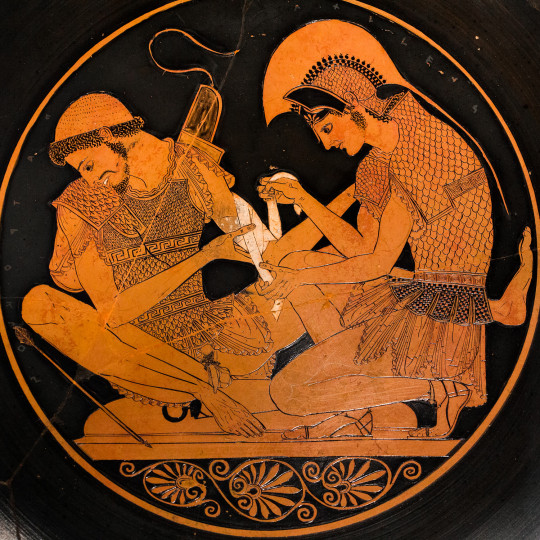
Achilles tending Patroclus in a kylix, by Sosias, 500 BC. See here.
In it, Patroclus's distinguishing characteristics are short curly hair, a beard and a non-straight nose (compare him with Achilles's).
In the frescoes of Pompeii, Patroclus is usually portrayed as a tanned young man with short brown hair, dark eyes and no beard.
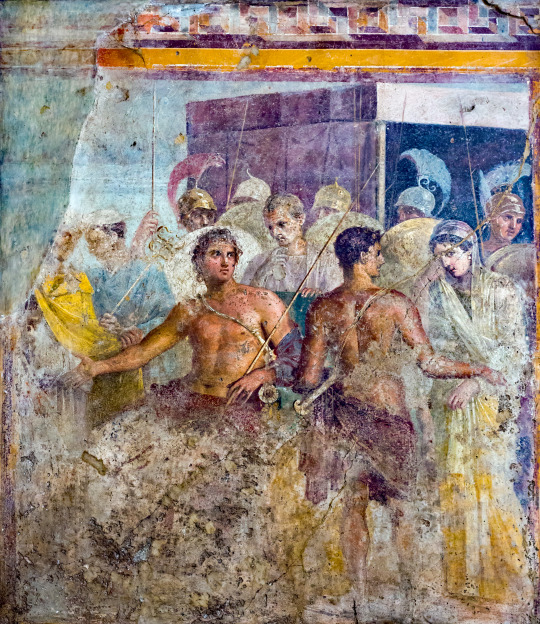
Fresco in Pompeii, Briseis being taken by order of Agamemnon. See here and here.
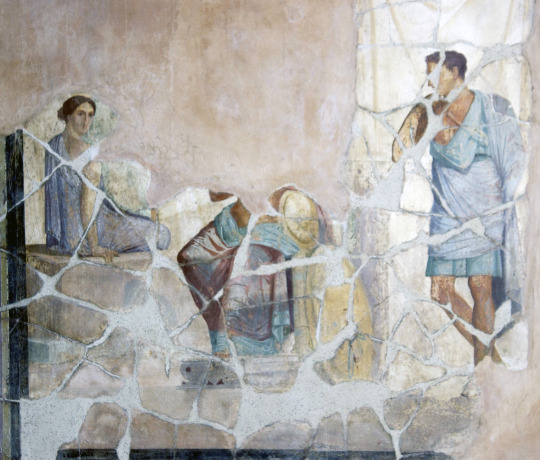
Fresco in Pompeii, respectively Briseis, Achilles and Patroclus. See here and here.
There is a Roman (copy of an original Greek, though) statue of a bearded man carrying the body of a young man from 200–150 BC, which has been thought to be Menelaus and Patroclus. However, the Wikipedia article says that the topic is up for debate, as there is a possibility it could be Ajax and Achilles or even Odysseus and Achilles, so I won't consider it sure. Here is the article, anyway. But the young man has short curly hair and no beard.
According to Pausanias, Polygnotus painted Patroclus without a beard in the Lesche at Delphi.
[...] and beyond Achilles is Patroclus standing. With the exception of Agamemnon these figures have no beard.
Description of Greece, 10.30.3. Translation by W.H.S. Jones.
For some reason, Hyginus made a list of the most beautiful (?) and put Patroclus there. Good for Patroclus, I guess
THOSE WHO WERE MOST HANDSOME: Iasion, son of Ilithius, whom Ceres is said to have loved [credible, since vouched for by old histories]. Cinyras, son of Paphos, king of the Assyrians. Anchises, son of Assaracus, whom Venus loved. Alexander Paris, son of Priam and Hecuba, whom Helen followed. Nireus, son of Charops. Cephalus, son of Pandion, whom Aurora loved. Tithonus, husband of Aurora. Parthenopaeus, son of Meleager and Atalanta. Achilles, son of Peleus and Thetis. Patroclus, son of Menoetius. Idomeneus, who loved Helen. Theseus, son of Aegeus and Aethra, whom Ariadne loved.
Fabulae, 270. Translation by Mary Grant.
In Dares, The Prygian, there is a description of Patroclus. However, this text is still quite uncertain. It isn't certain if it has always been a Latin tradition or if it has a Greek original, in addition to other aspects that are still questioned. But I'm going to put it here just to clear my conscience.
Patroclus was handsome and powerfully built. His yes were gray. He was modest, dependable, wise, a man richly endowed.
Dares, The Prygian, 31. Translation by R. M. Frazer.

NON-MYTHOLOGICAL ASPECTS (INTERPRETATIONS, MONUMENTS, ETC)
Apparently, Patroclus was honored and had monuments, since in Geography Strabo says:
The length of this coast, I mean on a straight voyage from Rhoeteium to Sigeium, and the monument of Achilles, is sixty stadia; and the whole of it lies below Ilium, not only the present Ilium, from which, at the Harbor of the Achaeans, it is about twelve stadia distant, but also the earlier Ilium, which lies thirty stadia farther inland in the direction of Mt. Ida. Now there are a temple and a monument of Achilles near Sigeium, as also monuments of Patroclus and Antilochus; and the Ilians offer sacrifices to all four heroes, both to these and to Aias. But they do not honor Heracles, giving as their reason his sacking of the city. But one might say that, although Heracles did sack it, yet he sacked it in such a way as still to leave it a city, even though damaged, for those who were later to sack it utterly; and for this reason the poet states it thus:“He sacked the city of Ilios and widowed her streets;
Geography, 13.1. Translation by H. L. Jones.
According to Pausanias, one of the votive offerings at Delphi was an image of Achilles and Patroclus, sent by the Thessalians of Pharsalia.
The Thessalians too of Pharsalus dedicated an Achilles on horseback, with Patroclus running beside his horse [...]
Description of Greece, 10.13.5. Translation by W.H.S. Jones.
I only found these two mentions of Patroclus in a more religious context and there is always Achilles at the crime scene. This makes me think that if there were other religious practices related to Patroclus, they were probably the kind that honored a conjuct rather than a single person. It wouldn't be strange, since there were other cases like these, for example the Dioscuri, or Helen and Menelaus in Sparta (first case because they're brothers whose brotherhood is relevant in the myth, the second because they are a couple. In other words, there is a platonic and a romantic example! So I think even platonic Patroclus and Achilles wouldn't be that strange to appear as a pair of friends in a religious context). In any case, it isn't possible to be sure.
Update (25/04/2024): flaviafulvia in the comments added Arrian's Voyage Round the Euxine Sea, supposedly written in Roman Greek times by the Greek historian Arrian of Nicomedia (86 AD-160 AD) to the Roman emperor Hadrian. In this text there is a mention of a dual cult of Achilles and Patroclus on the Island of Achilles (also called by other names such as Leuke and White Island). Pindar mentions this Island em Nemean Ode 3: "and Achilles holds the shining island in the Euxine sea."
Regarding interpretations of Achilles and Patroclus' relationship:
Note: I'm using interpretations that don't come from poems, plays, etc. So you're not, for example, seeing Aeschylus and others here. They're interpretations of rhetoricians, philosophers, etc.
Aeschines in Against Timarchus considered it romantic and/or sexual, although it's important to mention that this text is a process. Timarcus had accused Aeschines of a crime, and Aeschines retaliated by prosecuting him. In this process, he used the Athenian laws that prohibited a man from having paid homosexual sexual relations against Timarcus. Achilles and Patroclus are only part of the argument here. Furthermore, the lines of The Iliad that Aeschines presented were apparently corrupt. See 1.142.
In Xenophon's Symposium, he wrote Socrates explicitly stating Patroclus and Achilles' relationship was a platonic bond. Whether that was Socrates' opinion or Xenophon's is another story. See 8.31.
Plato in his Symposium considered their relationship as romantic, although under a Classical Athenian perception — i.e., with restrictive concepts of erastes and eromenos. See 179e-180a.
The author of Amores (it isn't certain if it was Lucian. If it was Lucian, this text is non-Greek, as Lucian was Syrian) considered them a romantic and/or sexual relationship. See 54.
Plutarch in Amatorius portrays them as in a romantic relationship, although it's in the context of refuting the famous theory that a male relationship is better than a relationship between a man and a woman. See 5.
Martial portrayed them in a sexual relationship and didn't imply anything romantic. This text is non-Greek, as Martial was probably Roman. I didn't find this excerpt in English except on the Internet Archive because on other sites they removed it (literally. It said they had removed it, probably due to content considered obscene. Suffice to say that Martial's epigrams are sources of Latin obscenities.), but Perseus still has it in Latin here. See Robert Fletcher translation, Book 11 epig 44 (pag 111).
Athenaeus of Naucratis used Patroclus and Achilles as an example of romantic love between men The Deipnosophists, more specifically he used Aeschylus' version. See 13.75.
The bucolic poem, written by Theocritus (note: authorship somewhat unsure), Idyll XXIX uses Patroclus and Achilles as a comparison of romantic love. See Idyll XXIX, 25.
Conclusion: there isn’t much information about the Archaic Greece, but in the Classical Greece the debate about the nature of their relationship gained more prominence. Such debate continued in subsequent times. In mythological works, the only source that has confirmed this relationship is Aeschylus.

REFERENCES
Here I'll be organizing the references used. I include authors, dates, authors' ethnicities and types of source because I think it makes the context easier to visualize — a person from the Classical period didn't think like someone from the Archaic and a philosopher didn't write with the same intention as an encyclopedia. And of course, just because I specified excerpts doesn't mean you can understand them all by just reading them without context!
Mentions/scenes
The Iliad, Homer - the entire poem since it's the greatest source we have on Patroclus
The Odyssey, Homer - Book III, 102-117; Book XI, 465-470; Book XXIV, 15-18 and 71-79
Fragments attributed to Hesiod - Catalogue of Women frag 19A and frag 61
Cypria, attributed to Stasinus - frag 1
Fragments attributed to Aeschylus - Myrmidones frags (59-66) | Nereids frags (72-75) (because they accompany Achilles' mourning over the death of Patroclus)
Olympian Odes, Pindar - ode 9 | ode 10, 10.1 (see the scholiasts' comments on these same odes)
Philoctetes, Sophocles - 403
Heroica/On Heroes, Philostratus - 675
Idyll XXIX, Theocritus - 25
Symposium, Plato - 179e-180a and 208d
Symposium, Xenophon - 8.31
Geography, Strabo - 9.4.2 | 9.5.9 | 13.1.7 | 13.1.32
Fabulae, attributed to Hyginus - 81 | 97 | 106 | 112 | 114 | 257 | 270 | 273
Library/Bibliotheca, attributed to Apollodorus or Pseudo-Apollodorus - 3.10.8 | 3.13.8 (there is a mention of a Patroclus I don't include because it's Patroclus son of Heracles, not the Patroclus son of Menoetius)
Deipnosophistae, Athenaeus of Naucratis - 1.31 | 13.75 (here there is also a Patroclus who is not who I'm talking about, this other is Ptolemy's general. Also, other parts mention Patroclus, but they're about other characters like Nestor and Menelaus, so I didn't include them. )
Epigrams, Martial - 11.43
Aristides, Plutarch - 20
Arrian's Voyage Round the Euxine Sea, Arrian of Nicomedia - 16-18 sections on Wikipedia
Description of Greece, Pausanias - 3.19.13 | 3.24.10 | 4.28.7 | 5.8.3 | 5.19.8 | 10.4.2 | 10.13.5 | 10.26.6 (there is another Patroclus mentioned by Pausanias, but don't confuse him with the mythological Patroclus. The other one is Egyptian, not Greek!)
Amores, attributed to Lucian of Samosata or Pseudo-Lucian - 54
Bibliotheca, Photius - 190.9 | 190.6
Dictys Cretensis, ? - If you're really interested, just read the whole thing
Source dates
For reference:
8th century BC = between 800 BC-701 BC
7th century BC = between 700 BC-601 BC
3rd century BC = between 300 BC-201 BC
5th century BC = between 500 BC-401 BC
1st century BC = between 90 BC-0 BC
1st century AD = between 0 AD-90 AD
2nt century AD = between 101 AD-200 AD
9th century AD = between 801 AD-900
The Iliad and The Odyssey, Homer - 8th century BC, the year is much debated (Greek)
Theogony, Hesiod - 8th century BC, maybe 730–700 BC (Greek)
Fragments attributed to Hesiod - multiple dates because there are multiple sources
Cypria, attributed to Stasinus - 7th century BC (Greek)
Fragments attributed to Aeschylus - multiple dates because there are multiple sources
Olympian Odes, Pindar - 5th century BC (Greek)
Philoctetes, Sophocles - 409 BC (Greek)
Heroica/On Heroes, Philostratus - I haven't found the date of the text itself, but Philostrathus is theorized to be from 170 AD – 240 AD (Greek)
Idyll XXIX, Theocritus - 3rd century BC (Greek)
Symposium, Plato - 385 BC – 370 BC (Greek)
Symposium, Xenophon - 360 BC (Greek)
Geography, Strabo - late 1st century BC or early 1st century AD, the year is much debated (Greek)
Fabulae, attributed to Hyginus - I haven't found the date of the text itself, but Martial is theorized to be from 64 BC – 17 AD (Roman)
Library/Bibliotheca, attributed to Apollodorus or Pseudo-Apollodorus - 1st or 2nd century AD (Greek)
Deipnosophistae, Athenaeus of Naucratis - early 3rd century AD (Greek)
Argonautica, Apollonius Rhodius - 3rd century BC, maybe 283 BC–246 BC or 246 BC–221 BC (Greek)
Epigrams, Martial - I haven't found the date of the text itself, but Martial is theorized to be from 38/41 AD – 102/104 AD (probably Roman)
Aristides, Plutarch - I haven't found the date of the text itself, but Plutarch is theorized to be from 46 AD – 119 AD (Greek)
Arrian's Voyage Round the Euxine Sea, Arrian of Nicomedia - 2nd century AD (Greek)
Description of Greece, Pausanias - 2nd century AD (Greek)
Amores, attributed to Lucian of Samosata or Pseudo-Lucian - uncertain, but certainly AD (if it's by Lucian, Syrian)
Bibliotheca, Photius - 9th century AD (Greek)
Dictys Cretensis, ? - ? AD (Greek)
Type of Source
The Iliad and The Odyssey, Homer - epic poem
Theogony, Hesiod - poem
Fragments attributed to Hesiod - scholiasts comments
Cypria, attributed to Stasinus - epic poem (lost)
Fragments attributed to Aeschylus - scholiasts comments
Olympian Odes, Pindar - collection of odes
Philoctetes, Sophocles - play
Heroica/On Heroes, Philostratus - dialogue
Idyll XXIX, Theocritus - bucolic poem
Symposium, Plato - dialogue
Symposium, Xenophon - dialogue
Geography, Strabo - geographical encyclopedia
Fabulae, attributed to Hyginus - greek myths encyclopedia (adapted for a Roman public)
Library/Bibliotheca, attributed to Apollodorus or Pseudo-Apollodorus - mythological encyclopedia
Deipnosophistae, Athenaeus of Naucratis - dialogue
Argonautica, Apollonius Rhodius - epic poem
Epigrams, Martial - collection of epigrams
Aristides, Plutarch - biography
Arrian's Voyage Round the Euxine Sea, Arrian of Nicomedia - travel guidebook
Description of Greece, Pausanias - travel literature
Amores, attributed to Lucian of Samosata or Pseudo-Lucian - dialogue
Bibliotheca, Photius - text reviews
Dictys Cretensis, ? - first-hand account
Others
Apostrophe in Homer, Apollonius and Callimachus by Jacqueline J . H . Klooster, available in Academia.edu site (I used the apostrophe concept from here)
Revisiting the Apostrophes to Patroclus in Iliad 16 by Emily Allen-Hornblower, available in The Center of Hellenic Studies of Harvard site (I recommend reading it if you are interested in the use of apostrophe in Patroclus' scenes)
Irregularities in the Funeral of Patroclus by Aubrey A. Cum, available in University of Georgia site.
Patroclus and Elpenor. Dead and Unburied, in The Upper and the Under World in Homeric and Archaic Epic by Menelaos Christopoulos, available in Academia.edu site.
#Ask#Anon#13k about Patroclus lol#Tagamemnon#Patroclus#Achilles#Menoetius#Because Achilles and Menoetius were considerably spoken of as well#Greek Mythology#The Iliad#Patrochilles#Because of the part about versions of their relationships#This took a while to write (almost a week)#If anyone has anything to add feel free to do so#The interpretative parts are subjective (i.e. disagree if you want)#There was more of Patroclus in the scholia of Homer and Pindar but I don't know Greek#I'm definitely not a classicist please remember this#For the love of god please consider the context of the sources (the era for example)#I love Patroclus did you notice?#I tried to find more without Achilles but Patroclus in fact has almost all of his sources linked to Achilles#Just in case of “why is it always Achilles and Patroclus and never just Patroclus?”#I just saw this bunch of sources and apparently it's been like this forever and there is no escape it's not my fault!#I love him but the guy is reaaaaaally a secondary bro and it's time to accept that#Patroclus doesn't have to be one of the main characters to be a personal fav guys#Also he's a badass but please don't make that his only trait#Everyone there is a badass just being a badass isn't enough#Much is said about dogs but Patroclus and HORSES#And I'm getting personal in these tags time to stop#Birdiethings
25 notes
·
View notes
Text
Don’t get me wrong, I love all of the mlm greek myths and retellings.
But what we need is more sapphic retellings of greek myths. And by that I mean give me Medusa and a blind girl.
Give me a kind, soft, sweet girl who was everything as a kid. Who had a future. Who could have been everything she ever wanted. Give me a girl who lost all hope as she lost her eyesight. Who gave up on life. Give me a girl who was still everything but refused to believe so.
Give me Medusa, who wanted to be loved. Who could have been soft and kind but was prevented from doing so. Give me her anger and resentment toward men, and toward herself. Give me Medusa who thinks she will spend the rest of her life as a villain who has nothing to offer the world except for shame.
And give me them finding themselves within one another. Give me a girl who is soft and gentle to Medusa, who doesn’t see her as a villain but as a person. Give me Medusa showing the girl that she is something whether she can see or not. Give me survivors. Give me two girls who are so seen by each other, that despite their isolating factors come together and are so completely in love with each other they have no choice but to accept it. I want cute dialogues and soft touches. I want healing and redemption. I want hurt and comfort. I want them to learn to love themselves and life, just as they love each other.
#if you want to hear more of my blind girl headcanons pls send me an ask or message me or smth#i could talk about them forever#i love them your honor#Greek Mythology#greek#medusa#medusa loves the blind#medusa and the blind girl#im making my own greek myths and no one can stop me#song of achilles#yea i tagged tsoa what are you gonna do about it#honestly achilles and patroclus shippers would love this#gay greek mythology#sapphic#wlw#wlw representation#we need soft greek myths#i want a gay version of odysseus and penelope#i love them too your honor#i love everyone your honor#tsoa#achilles and patroclus#percy jackson#percy jackson kid
48 notes
·
View notes
Text
PJO Characters at Pride
Credit to @automaticcatsandwich whom I made this with. I have not finished the books so I apologise for any inaccuracies. This ran away on me I'm so sorry
All the campers go to DC Pride together
The Hephaestus kids make the coolest floats you've ever seen
The floats are pulled by pegasi so they literally float
Nobody can figure out how those ponies are flying but hey man, stranger things have happened
Satyrs playing queer anthems on their reed pipes and campers take turns doing karaoke
The Seven are throwing handfuls of glitter and the occasional drachma into the crowds from the top of the float
They're screaming along to Whitney Houston's I Wanna Dance With Somebody and the crowd is loving it
The Hunters of Artemis representing those on the asexual spectrum
The Aphrodite cabin celebrating all different kinds of love
Kids of Apollo (led by Chiron and Apollo himself) shoot arrows into the sky that explode into showers of rainbow powder in the colors of different flags
Leo is loving the attention his drag act is getting and he's pleased the arrows worked because he spent forever getting them just right
Appearances from other Riordanverse characters, like Magnus and Alex (I haven't read Magnus Chase yet so I don't have any hcs but if you have some add them please)
Hestia making sure everyone is included and loved
Percy, pissed off, holding a sign saying "Even Hera supports gay marriage* "
Piper representing all the unlabeled queers
Kids of Athena arguing with homophobes and throwing misconstrued Bible quotes back in their faces with relish
They all have fully thought-out arguments because they read the Bible in the original Greek and "JESUS NEVER SAID THAT!!"
"MOM KNEW JESUS AND SHE SAID HE WAS AN ALLY"
Rachel out there helping and doing art commissions
Rachel taking artful shots of queer couples kissing on her polaroid camera to gift them saying, "You're beautiful"
Rachel and Piper's dads funding an AIDS/Sexually Abused Queers/Queer Youth Shelter together
Nico raising famous dead queers to protest alongside them
Dead politicians that petitioned for gay marriage are horrified that it still isn't legal in all 50 states and going to protest outside the White House
Dead AIDS victims going alongside them to stand outside the White House in silence and just stare through the windows at Joe Biden who has a minor stroke seeing all the skeletons
FAMOUS DEAD QUEER SINGERS DO A CHARITY CONCERT
AND FREDDIE MERCURY IS HEADLINING CRYING TEARS OF QUEER JOY
Letting dead queers see the amount of acceptance that has risen in past years
Iris making a gigantic triple rainbow in the sky
Aphrodite dropping rose petals on kissing lovers
Raising Patroclus and Achilles to show them that their kind of love is accepted now
*as long as it's healthy, of course
This is all I can think of right now, but if you have any additions to this post, add them! I would LOVE to see what you guys come up with :)
#percy jackson#pjo#hoo#toa#long post#gay pride#percy jackon and the olympians#annabeth chase#percabeth#grover underwood#the song of achilles#tsoa#hephaestus#pegasus#pegasi#hunters of artemis#artemis#apollo#chiron#greek mythology#aphrodite#greek gods#greek godesses#leo valdez#hestia#piper mclean#athena#rachel elizabeth dare#nico di angelo#pjo hoo toa
118 notes
·
View notes
Note
What’s your favorite piece of art? One you’d travel to see or experience?
Oooh man what a tough question. I really love art and I go to museums and galleries as often as I can but the moment this question hit my inbox I drew a massive blank LOL there are several artists and artworks that I love and that I've either already travelled to see or would gladly do so. But like, if you're asking about my TOP favourites, those that I would literally CRY or something if I ever saw up close, then I would have to be boring and predictable and answer that it's something Patrochilles related haha. And of course I can't just choose one, so you're getting a small selection 😊
Achilles bids farewell to Briseis, Roman Fresco

You'd better trust and believe I'd travel to Naples just so I could see this fresco irl 😭🙏 This Patroclus lives in my brain rent free
The Ambassadors of Agamemnon in the tent of Achilles, Jean-Auguste-Dominique Ingres
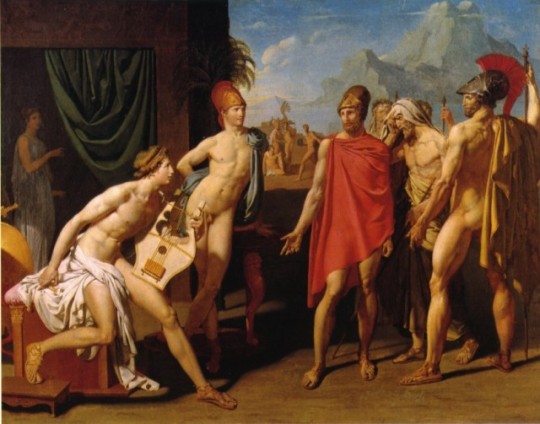
Another huge favourite (I hope Tumblr doesn't flag me for this LOL). I love how soft and sensual the forms and lines are here, also look how cunty my boy Patroclus looks in this, absolutely love that for him 🙏
Patrocle, Jacques-Louis David
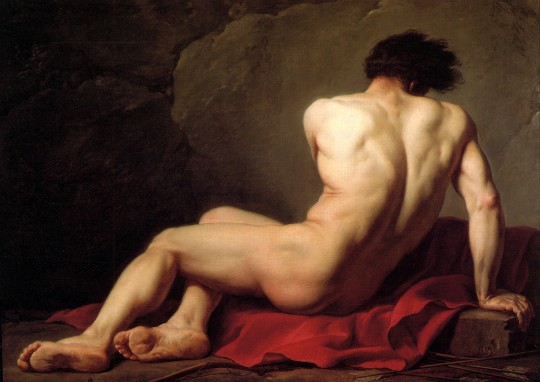
I really have no words for this one, I've spent hours looking at it 🥹
The Education of Achilles, James Barry

I always really love art of Achilles in his younger years, and there are several paintings of him with Chiron but this has to be my favourite. A lot of the other paintings show Chiron teaching Achilles how to fight, but I love how the lyre is at the center of this one.
Achilles and the Body of Patroclus, Nikolai Ge
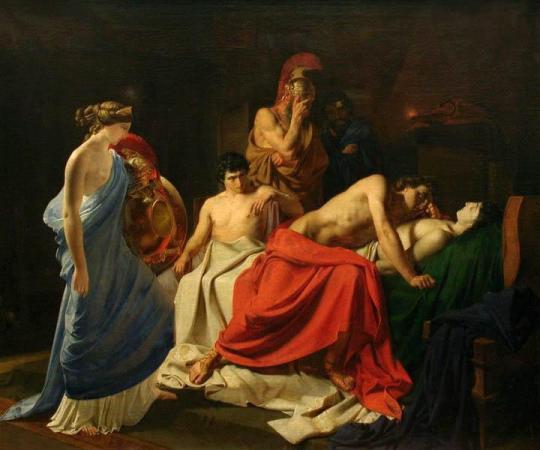
Another scene beloved by painters-- there are many renditions of Achilles lamenting the death of Patroclus but I really love how quiet and intimate this one is.
Achilles Binding Patroclus' Wounds, Sosias Painter
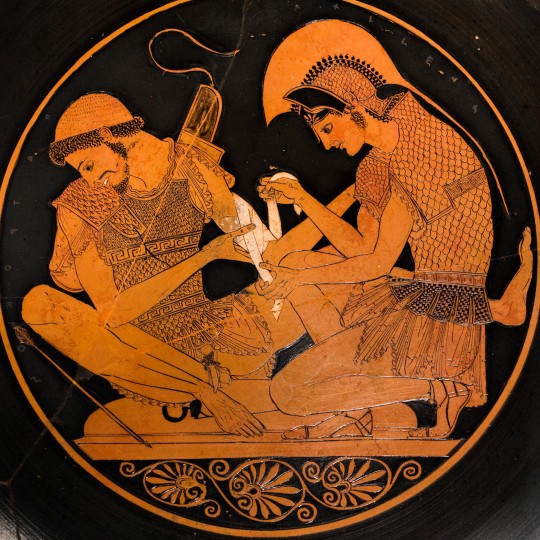
No post about fave patchilles art could ever be complete without this one. Every single detail on this makes me insane (from beardless twink Achilles to bearded twunk Patroclus, the details on the armour, the dicks out, the slutty skirts, INSANE I tell you), I could go on about it forever but this is already getting long so I think I'll cap it here LOL
#patrochilles#the iliad#homer's iliad#i'm sorry I can't be normal even about the most innocent of questions#'hey jo what's your favourite--' YO did someone say patrochilles?? cause that's what i'll make this all about#anyway. thanks for listening 🙇♀️
23 notes
·
View notes
Text
classical name allusions in the locked tomb
sorry guys I'm a one trick pony. I'm sure most of these have been said before but I LOOOVE pulling on threads until they tangle up and get stuck so. these used to be in alphabetical order but then I remembered about some lol. spoilers for all the books. I'm not arguing anything I'm just kicking rocks around
alecto
one of the three furies sent to punish mortals for unforgivable crimes (like killing family members... or ppl who have 'sworn false oaths.' get that.)
alecto specifically was sent by juno in book 7 of the aeneid to stir up war amongst turnus and aeneas; she impersonates the latin queen and pretends to be a priestess. might pay off, might not.
cassiopeia
queen and mother of princess andromeda (from the perseus myth); infamously vain, boasted that she and her daughter were more beautiful than goddesses and got andromeda stuck on a rock as a sacrifice, good job hon. as punishment gets chained to her throne and set as a constellation forever (this does make me wonder about the parallel to alecto there w the chains, but I don't know if it's worth pursuing, likely not. but I have seen theories that like alecto, she's not actually dead)
tamsyn notes in the back of harrow that this comparison is 'doing her a disservice', however
juno
roman queen of the gods, goddess of marriage, ideal wife etc etc, honestly I think she is likely just called that for the matriarch vibe but if anyone has an insight on why else she's named that lmk. she's a lot chiller than the mythological juno is generally portrayed fjfhjd
priamhark (harrow's father)
priam was hector's father and king of the doomed city of troy; he had one hundred children, almost all of whom die. you can see the parallel I'm pulling here right.
pellemeana (harrow's mother)
peleus was the father of the vastly overpowered achilles, who was his only son. same implication; hundreds of kids from priam + one incredibly OP kid from peleus that spelled the doom of lots of priam's kids = barebone parallel to harrow's creation
if this means we have to consider harrowhark to be either achilles, or hector, or achilles-and-hector... lol oh dear
(if that makes gideon either patroclus or andromache... bonus fear. terror even)
sarpedon
I mean as far as I remember admiral sarpedon wasn't that important so far, but sarpedon is a son of zeus in the iliad that patroclus kills while impersonating achilles. it's like his Big Kill. zeus considers saving him but the others are like 'you didn't let US save our kids' and he's like 'damn true :/' and stops trying to intervene
cytherea
allusive of aphrodite; it's another name for her, linked to the island where she was supposedly born from the seafoam. an interesting choice. I do like that the dress she's first described wearing is 'seafoam green frills' though, it's like a little clue. the wiki points out that cytheran aphrodite was adopted from the canaanite (ha ha) deity astarte, and had war-like aspects that were later suppressed, which makes a lot of sense.
might be worth noting that if we're going with the ouranos-genital-seafoam thing for aphrodite's origin, that in one version the furies including alecto were also created then, from his blood. they're basically sisters. fun. (or not so fun for john but whatever)
palamedes
palamedes in mythology was the one to put the infant telemachus in front of odysseus's plough, and therefore force odysseus to renounce his faked madness and go to troy; odysseus never forgave him for this, and one way or the other he gets him killed.
(one might also look to the arthurian sir palamedes, who was in unrequited love with iseult, lost her to sir tristan but wasn't a little bitch about it, and then goes on a quest concerning a 'questing beast', and eventually in one version he, percival and galahad trap the beast in a lake and slay it, so stick a pin in that why don't you)
originally called diomedes (who is, as tamsyn puts it, 'athena's favourite goodboy') but I think that could say interesting things about his ability to go up against lyctors (or even jod) since with a little help from an A-named goddess, the big thing diomedes does in the iliad is wound two gods and make them flee the battlefield... hm
also diomedes is one of the only ones who makes it out the other side of the trojan war lol
camilla:
possibly allusive of the warrior maiden camilla in book 11 of the aeneid, who kills hella men before being killed herself (because she's the token lady warrior on the opposite side in an ancient epic, she can't survive haha how preposterous.)
happily camilla as she is in the locked tomb cannot be killed off as camilla... because she no longer exists as camilla. paul's here now. say hi.
ulysses:
a (roman) name for odysseus. I know john SAYS he didn't name him after the mythological one, he named him after a dog (the implications there are so... bad), but john lies like a rug and frankly insisting that he didn't makes me feel even MORE like he did, or even if he's not lying it works anyway.
after all, odysseus wouldn't have gotten far without athena's divine intervention; one might even say he owes everything to his patron god, the same way ulysses literally owes everything to john since he and titania were the pet projects from pre-resurrection
I do not want to talk about james joyce I only read one chapter of ulysses for a seminar and that was enough thanks
also, what was ulysses known for but vanishing for ages, being presumed dead, then pulling back up miraculously Not Dead and killing a bunch of people. he could be back... he had that suspicious stoma death like augustine. this is making me realise that loads of the lyctors have suspect deaths
(also by the time the romans got to odysseus they were kind of dubious about him since he had a lot of non-roman traits like 'no honour' and 'outright lying to people for funzies' so if he does come back I half-expect him to be a bit of a nightmare lol but that's probably unfounded)
pyrrha:
as mentioned by tamsyn, the name that achilles takes while he's disgused as a woman on scyros to avoid the war, but exposes himself as achilles when he forgets himself and tries to fight instead of flee. I think the parallel there is pretty obvious lol
(and achilles's son, who goes absolutely nutters and kills loads of people in the siege of troy, is called neoptolemus... or pyrrhus.)
means red-haired as well lol... it's a great name for the g1deon / pyrrha / wake / gideon car crash going on
#i might have forgotten something/someone but this is what I got rn#the locked tomb#gideon the ninth#nona the ninth spoilers#nona the ninth#harrow the ninth#tlt#my post
100 notes
·
View notes
Note
Hello....If you don't mind me asking, who are your favorite romantic relationship's couples in books/ manga/manhwa/ anime/movies/tv series (can be canon or non-canon)? Why you love them? Sorry if you've answered this question before....
Hope you don't mind if the same person ask a different questions. Thank you so much @metalandmagi .....
Funny you should ask, because I was just listening to a podcast episode about favorite fandom ships, and I had actually started making my own list that I was going to post anyway! And I don’t mind you asking, since I don't really have people to talk to about this stuff. I like looking at your blog and seeing other people’s answers too!
Here's my top ten! These are going to be kind of repetitive because I’ve already talked about these fandoms so much, but these are my favorite CANON SHIPS, meaning they’re actually together or at least have kissed or something. I have a million non canon ships.
10. Jem, Will, and Tessa from The Infernal Devices- I wanted to keep myself to one ship per fandom, but I couldn’t help it, I just love this OT3 so much. I don’t care what anyone says, they are a poly relationship, not a love triangle (and I maintain that if Jem wasn’t already dying, he and Will would have realized they loved each other romantically, and their parabatai bond would have fucked them over eventually). They all have an equal amount of love and respect for each other, and they balance each other so well. And I appreciate that none of them are relegated to being “the overly jealous partner who ruins everything for the other two.” We get time with each of them and love them all equally.

9. Patroclus and Achilles from The Song of Achilles- Call me a basic bitch, but these two are unparalleled in terms of doomed romances. I love friends to lovers, and the story is so widely spanning that it gives their relationship such gravitas.
8. Yona and Hak from Akatsuki no Yona- Still haven’t finished the manga, but these two are god tier for fantasy romances. I love that they completely lose their minds over each other whenever they are not within arm’s reach, and they’re another great example of childhood friends to lovers. Hak’s “teasing” attitude in the beginning of the series wasn’t my favorite, but it’s funny to look back on it later, knowing that he’s so in love with Yona and would murder the first person to disrespect her.
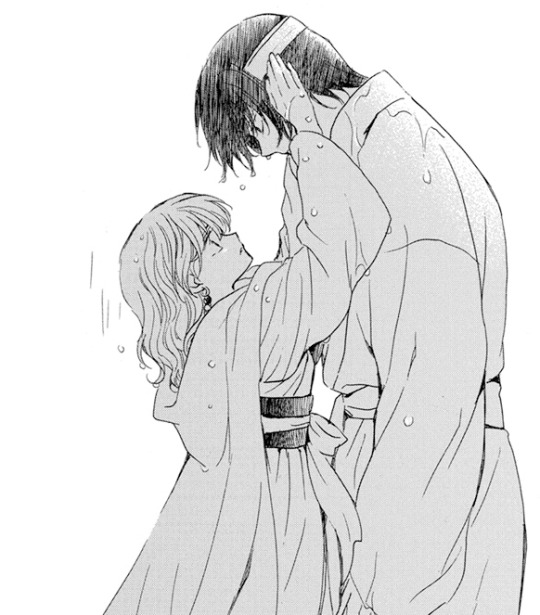
7. Shigure and Akito from Fruits Basket- Because why would I choose one of the normal, healthy relationships when I could go for one of the most fucked up romances in shoujo? These two…I don’t even know where to start. They’re the definition of toxic for most of the series, but by the end, you’re really rooting for them to be together with the Sohma family curse broken. Shigure is desperate for the curse to be broken so he can prove to Akito that he loves her without them being tied together by fate. Akito feels like she needs the curse because otherwise everyone will leave her forever. Akito sleeps with Kureno. Shigure sleeps with her mom. They’re “gaslight, gatekeep, girlboss” meets “mansplain, manipulate, man-whore.”

6. Sasaki and Miyano from Sasaki to Miyano- What can I say? They’re just so freaking cute! I think they represent the romance a lot of people in fandom want, because they bond over manga and slowly come to learn more about each other. Sasaki never pressures Miyano to return his feelings, and I appreciate the patience he has in waiting for Miyano to give him an honest answer to his confession.

5. Jesper and Wylan from Six of Crows- Another basic answer, but these two are so entertaining whenever they’re together. I love that Jesper starts out teasing Wylan relentlessly about looking like a pampered rich kid (despite the fact that Wylan also lives on the streets), but Wylan deadass saves the group time and time again, so Jesper comes to respect him more. This is how you do teasing in a relationship: they get under each other’s skin but aren’t complete dicks to each other. And I appreciate that the Shadow and Bone show changes their dynamic slightly while keeping the chaotic duo the same at their core.
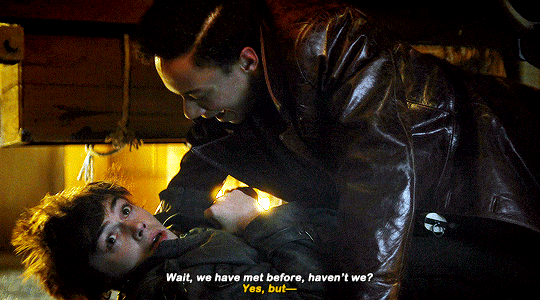
4. Percy Jackson and Annabeth Chase from the various Percy Jackson series- The pinnacle of middle grade/YA romance. Nobody else is doing it like these two. What works about their relationship is that we truly believe their friendship as 12 year olds before they start to have feelings for each other. So many times, authors shove two characters together because they feel like they need a romance, but Percy/Annabeth progress so naturally. They tease each other, but they know they’re both capable individuals at the end of the day (and their wildly different brands of intelligence work so well), and as long as they’re together, they can get through anything.

3. Hua Cheng and Xie Lian from Heaven Official's Blessing- I’ve shipped these two for much less time than these other ships, but they have smashed their way to my top 3 ships of all time. How do you compete with a god who’s fallen from grace and his eternally devoted follower who would burn the world down to see them smile? How do you compete with Hua Cheng, who has stayed by Xie Lian’s side for hundreds of years out of pure devotion, but not in a creepy or weird stalkery way? I think the biggest thing this ship has going for it is its sincerity. Hua Cheng doesn’t stay with Xie Lian because he’s hoping Xie Lian will fall for him eventually. He doesn’t believe he’s even worthy of Xie Lian’s love. But he stays anyway, because that’s what unconditional love is like. You stay when the one you love is at their lowest and you can’t do anything to help. You stay when they’re fighting the heavenly emperor and kick ass alongside them. You hold an umbrella over their head when it's raining blood and carry them across the ground when it's littered with corpses.
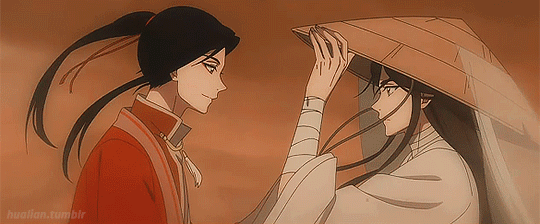
2. Magnus Bane and Alec Lightwood from The Mortal Instruments/Shadowhunters- These two have destroyed me over the years. I think the best thing about this ship is how they bring out the best in each other and have changed each other’s lives for the better. Magnus is so outgoing and free spirited, but with Alec, he wants to “settle down” (lol) and raise a family. Alec started as the personification of the frowny face emoji, stuck in the closet with a stick up his ass, but now he’s basically running the shadowhunter world. They’re the perfect example of “opposites attract” who have changed their world simply by being in love.

1. Damen and Laurent from Captive Prince- Speaking of couples who change their world simply by being in love…I don’t know if any other ship will top them for me. All the other enemies to lovers ships can get the fuck out. They’re nothing compared to Damen and Laurent. So many times, people will write “enemies to lovers” or “hate to love” relationships that are just two characters snipping at each other or bullying each other for no reason. Get that shit out of here. These two start with the purest, most honest loathing possible. They hurt each other in countless ways, but they come to learn each other slowly. They have every reason to be enemies, but they come through each layer of trauma with love for each other. They’re the kings (pun intended) of this trope.
Honorable mentions: Nick and Charlie from Heartstopper- They’re just so wholesome and sweet. The progression of their relationship from like to love is so realistic, and they’re basically the live action/book version of Sasaki and Miyano.
Ronan and Adam from The Raven Cycle- (haven’t read the last book in the Dreamer trilogy, but I hope nothing bad happens). Their differing brands of chaotic energy compliment each other perfectly, and as a reader, the slow realization that Ronan is in love with Adam was so eye opening and satisfying in a way few other series have been able to capture.
Just for fun, here are some of my “less canon” ships too.
* Inej and Kaz (they're practically canon, but they never explicitly say they're together or in love...but we all know they are)
*Kylo Ren and Rey (also practically canonical since they've at least kissed)
* America and England from Hetalia (if I really want to go back to my fandom shipping roots. I read nothing but fics for them for like 2 years in high school 😅)
*Izaya Orihara and Shizuo Heiwajima
*Hinata and Kageyama
*Carole and Tuesday
*Link and Sidon
#captive prince#shadowhunters#sasaki to miyano#tgcf#heaven official's blessing#percy jackson#pjo#six of crows#fruits basket#akatsuki no yona#tid#tmi
27 notes
·
View notes
Note
i know the new books are likely to capitalize on the show but i still really want a sequel to percy jackson's greek gods and heroes where apollo goes over the trojan war (since none of the other books apparently want to untangle that) except artemis is there to make sure he is both truthful & objective in his retelling but its still extremely obvious that he hates achilles and that they both hate agamemnon. bonus points if this starts off as a story he's telling will and nico to emphasize how overrated achilles and patroclus are. don't let people compare you to them. when do we get that one.
from your lips to Rick Riordan’s ears forever and ever please and thank you i love you ❤️🙏🏻
11 notes
·
View notes
Text
about the parallels between derby and bif / achilles and patroclus.
first of all, i need to warn you- if you have read the song of achilles, delete it from your brain. forget about it forever you can rest now it was all a bad dream. know that both their personalities and their dynamics were simplified and stripped of all their cultural significance, reducing them to a hormonal-thirteen-years-olds-wattpad-fanfiction-from-2012 kind of story that fucking irks me as a classic lits student. with all due respect to thirteen year olds writing fanfic on wattpad in 2012.
so, the thing about them. achilles is the strongest warrior of the greeks, just him deciding not to partake in the war is a decisive hit for the army; just one nod of his is enough to decide the entire fate of his companions. but also, he's driven by blind pride, personal gain, an archaic and profound sense of honor. except that, you know- this is much more natural of a mindset than it might seem, because it's a very part of the societal and cultural structure these warriors live in. it is a value that's passed on within generation and that any sane citizen would've had, it was the mentality of the ruling class and the contrary would've been an anomaly. (if ur interested in this aspect: see archilocus' shield)
i think it's already easy to notice how this parallels some of the very core aspects of the preps' context and derby in particular. every action, their very existence is a matter of honor and reputation; for derby in particular, the leader, the one who always calls the shots, and when he wants something there's no one stopping him, not even his own clique. he will have what he wants, and if just one small offense is done to him, it's everyone's fault, and nothing will get better unless the cut is mended.
and then there's patroclus. older, wiser. he's not as powerful as achilles, but he's a level-minded, resistant and skilled warrior, favored by the gods. that's mostly what i hate about what madeline miller did to him, trying to make him into a relatable, pacifist softboy- he's one of the greatest warriors of the army, respected and recognized by all. he's perfectly capable of standing up on his own and fighting without achilles, basically massacring an entire army; if apollo didn't intervene, he would have won against hector change my mind
the thing about them, though, is that... they're still stronger together. a warrior's arms were a sacred thing, so when patroclus wears achille's armor is much more than a simple impersonation. they re exchanging power, almost blending into each other, and patroclus fights with his own and achilles' power. do you see the parallel there?
derby is of course a great leader, and bif is a powerful fighter on his own; but when you put them together they become unbeatable, a force of nature that is born from the union of them.
and also!! one of my favorite scenes from the iliad is one where we see achilles, in his tent, playing the lyre, while patroclus sits in front of him. for one: sitting in front of each other was a gesture of great intimacy, almost symbolic. two: this is almost a contradiction with what we said about achilles before. he is a demigod, but here and now, playing sad music, sitting in front of patroclus, he becomes human.
and that's the thing about derby and bif, that in their life they're expected to uphold aristocratic values, to never show any trace of imperfections or flaws. that their pride and reputation, as they have been told their whole lives, is essential, and they have nothing without it. and yet, when they are together, they just let that superhuman mask fall, and they can just be fragile, emotional, they can have a heart beating and flesh and blood and they can love. when they're together they are human again
tad and peanut / romeo and juliet | bryce and chad / cupid and psyche
#i know i dont talk abotu them often but im very passionate abt this oay#like i truly really love the iliad lmao. so realizing the comaprisons made me all the most emotional#canis canem edit#bully#bully scholarship edition#preps#derby harrington#bif taylor#derbif#odyposts
17 notes
·
View notes
Note
Can I ask, what songs that come to your mind when you think of ItaJun, AkaFuri, and ZukKa?
I am SO GLAD you asked I have songs specifically for them and I have so many.
ItaJun
THEY HAVE A(basically) OFFICIAL ONE!!! It's:
Stand in The Darkness ft. Steve Memmolo:
I don't even need to explain this one, this is 100% Yuuji's POV on Junpei and it is SO ROMANTIC WTF just listen to it Anon you will see.
"But you and I'll be
As one forever
It's not goodbye
Never was
Swear that you'll still watch over me
I know I can do this"
I WILL BE WALKING INTO THE OCEAN WHAT? The entire song is exactly about Yuuji failing to save Junpei and his new goal of finding a proper way to die and give people proper deaths. "Swear that you'll watch over me"???? ITADORI YUUJI START EXPLAINING.
Sunset and Whale by Zhang Yuan and Vicky:
I don't know the exact meaning of this song, I can't find good translations anywhere but the gist of it is, it's about the beauty found in brief moments that you want more of but doesn't linger too long .
A whale surfaces for air in sunset and admires the light reflected on the waters, but the whale is tethered to the ocean, it cannot stay and watch the sparkle for long, and the sun will have to sink. Whatever beauty is found is fleeting, the universe and the people go on, without ever pausing to care, time doesn't stop, but that moment existed and it's real and you are always asking for more but there isn't.
I think that sums up ItaJun quite well doesn't it?
I Really Want To Stay At Your house by Rosa Walton:
It's technically a break-up song, but it's also used as an OST after a person dies so it works. I am interpreting it as about being too little too late to help someone and desperately trying to fix things to being back the way they were.
The singer notices signs of their lover having problems, but they reminisce about better times, trying to bring their lover out of whatever is dragging them down by asking their point of view,asking to stay beside them, to leave behind whatever is eating at them. But it doesn't work. Reminded me of Yuuji and Junpei's talk at the riverside, and Yuuji going over to his place and for the briefest moment Junpei was reaching back.
Zukka
Untouchable by Taylor Swift
It's so on the nose. Untouchable because you're brighter than the sun? Oh yeah. The night and moon imagery are the Zukka staple imo. But I need to find another one T.Swift just irks me these days.
Moonlight by Johnald
This is more relevant to my fic. It's super angsty. The lyrics have absolutely no relation with Zukka but the vibes got to me. It's about the despair the singer feels but finding hope and moments if goodness in their lover. Feels very Zuko POV of Sokka.
I Don't Dance from High School Musical
Chad and Ryan are just a Zukka AU.
AkaFuri
Sukidakara by Yuika
Super cute, it's a duet but the main version is singular and its like "I don't like you because you're cool, you're cool because I like you ". Also there's another line about hiw the oerson they like is super cool in front of others bur becomes a total sap around little dogs. THAT'S AKASHI. It's so 2nd year AkaFuri. Also "I wanna see you on weekends and fall asleep on the phone with you" is every AkaFuri fic ever.
Achilles's Heel by J.Maya
Akashi POV no doubt. AkaFuri gives such "The Song Of Achilles" Patrochilles vibe. Akashi being afraid of falling in love, hating the weakness it brings not because of himself but because his father won't approve. Although ji wanna say Furi's probably a lot more self-possesed than TSOA Patroclus.
8 notes
·
View notes
Text
Promise to Patroclus
my love, i still remember the day
clear as the river that flowed.
you traced my back with a feather's touch
and that's all the world was owed.
it was the beginning of the end,
how could I have ever known?
we bit into figs bursting with ripeness
naivety and youth, you and me alone.
you looked at me with your bright eyes,
and I swear I felt my head sway.
i prayed then, my love, first time in forever,
but even the gods looked away.
there's nothing i wouldn't give again,
to kiss your fluttering eyelid.
I was vain, my dear - arrogant and proud,
I did not see what you already did.
you wept and prayed and begged and warned, but I did not, could not heed.
you, my silly, foolish, beautiful boy,
you were more god than i could ever be.
and as i put on my armour,
your scent still occupies my veins.
the white lilies you once braided in my hair, now red with your sacrifice stains.
what happened next, i couldn't say,
patroclus do you know?
as men crumbled beneath my feet;
my naked heel craved the arrow.
and when it came, i am not ashamed
to admit: a relieved tear fled my eye.
it had been far too long, my love,
since my lip had breathed your sigh.
you're the only part of me
that's mortal and without sin.
what's achilles without his lover?
a golden lyre with no string.
death trembles to keep us apart,
my promise comes to rest:
I'd follow you, my love, my reason,
from one lifetime to the next.
r.s
#achillesandpatroclus#the song of achilles#tsoadaily#tsoa patroclus#tsoa achilles#greek mythology#i read song of achilles and can't stop crying so i had to write down my feelings#achilles#the illiad#achilles x patroclus#greek#mythology#gods#zeus#apollo#greek gods#percy pjo#percy jackson#some percy jackson kids never grow up
78 notes
·
View notes
Note
Hey Lady, just curious. If you don't mind sharing, what are some of your favorite books?
Also, I love, love your stories. Thanks for sharing them.
Aw, thank you! ❤️🤗
Favourite books. Hmm, this is a tough one! I think it depends what mood I'm in, but I'll give it a go:
Swordspoint (Ellen Kushner) - I mentioned this book in the previous ask I responded to, but it's just a gorgeous book about love, politics, and devotion vs honour. Couple it with a main m/m romance and it's honestly a book I've never got tired of.
The Song of Achilles (Madeleine Miller) - I'm... probably going to be hunted down by fans of TSoA, so I'm going to preface this by saying: I love this book. I adore the prose; I love the romance. My academic background is Classics, and this is the first book I can remember that properly and explicitly deals with the Achilles/Patroclus romance. All that said, I do have quite a few nitpicks about her Patroclus portrayal, so although I absolutely recommend this, it's a book I have to put aside some of my own Patroclus preferences to enjoy.
Fire from Heaven (Mary Renault) - While I'm on a Classics kick: this book. It's an old-y, but a good-y. Non-explicit queer romance, but it's all about the early life of Alexander the Great. Hephaistion my beloved. You have to take it for what it is, but there's a reason Renault is still referred to as the queen of Alexander fiction. Is her depiction of him romanticised and often misty-eyed? Yes. Is it still eminently readable? Also yes. No, seriously, Hephaistion my beloved.
Rivers of London (Ben Aaronovitch) - Wonderful, wonderful set of books about a PC in the Met who ends up in the secretive (and tiny) magical investigative branch. Fantastic characters, fun murder mysteries and magic. Some of the later books in the series began to feel a little slow and same-y for me, but the first three are absolute wonders. Peter Grant is a phenomenal main character.
Lord of the Rings (JRR Tolkien) - I know, I know, this is predictable, but... I love it. I love it so much. I love the theme of kindness outlasting evil; of good triumphing not because of the strongest person, but because of the idea that anyone can stand up and make a difference. Also I love Boromir. I said what I said. 🤣
That's all I've got for now - I read a lot, but tend to be really, really picky, so something has to have a huge impact to stay on my 'absolute must-reads' list forever. However, I'm curious if anyone has any recs they'd like to send - I'm always up for hoarding more books!
17 notes
·
View notes
Text
the horror and the wild (and achilles)
basically i’m trying to explain why the songs that are in my iliad playlist are there at all and ofc i’m starting with none other than achilles. I’m gonna do this line-by-line so you can listen as you read but i won’t be doing repeated lines. enjoy <3
also, yes, i am aware that the song is written about an abusive relationship between father and child, and i love listening it to it in that sense (yes i’m traumatized) but in this context it’s obvs different. my ability to make everything about achilles is a gift that keeps on giving. if you don’t want this song to have different meaning than what it’s actually about, just stop reading.
You were raised by wolves and voices, every night I hear them howling deep beneath your bed —
The ‘you’ in this line is Achilles, who knew from a very young age that he was destined for greatness. He based his entire personality around the fact, hence the having been ‘raised’ by voices. The ‘wolves’ also remind me of the fact that he a) spent many years in a cave with Charon and b) had many father figures. I mean it. Count them.
They said it all comes down to (you) —
This ties in with the previous line. Achilles really was told that the fate of the war and hence the entirety of Greece depends on him, when he was literally a child. That’s way too much responsibility for a five-year-old if you were looking for parenting tips.
You’re the daughter of silent watching stones, you watch the stars hurl all their fundaments in wonderment at you and yours, forever asking more —
I mostly connect the female part of the song to Thetis. Firstly, I feel like this segment already makes her feel like an ethereal, divine being (although Madeleine’s voice does that well enough ngl), at the same time it also describes her character very well. The fact that the stars ‘hurl all their fundaments’ reminds me of Book (idk what book it is), where Zeus fulfills Thetis’ wish on Achilles’ behalf, no questions asked. I also feel like some people forget that Zeus literally wanted to marry her, she was that gorgeous, so ya.
You are the space that’s in between every page, every chord and every screen. You are the driftwood and the rift, the words I promise I don’t mean —
I don’t know what this means. Love it tho.
We’re drunk, but drinking; sunk, but sinking —
I love this line so much, you have no idea. It brings up the idea that while they all know that they are fated to die and it is guaranteed, there’s still living it in real time. They’re eating, laughing, speaking, with the knowledge that tomorrow they won’t be able to. They’re dead men walking. Also, on a less existential note, it reminds me of the fact that they’ve doomed themselves by starting the war and yet they continue it. They’ve dug themselves a hole and instead of hopping out, they dig deeper.
They thought us blind, we were just blinking —
Patroclus and Achilles now: Their decision to put the war on hold, a momentary action, is the blinking, in relation to “blindness” which would’ve been leaving. The ‘they’ who thought them blind could really be Agamemnon, who underestimates and insults Achilles with the little party he sends to him. Or it could be Hector and the Trojans who believed they were safe … and then Achilles came back.
All the stones and kings of old will hear us screaming at the cold —
The stones are a perfectrepresentation of the Trojan wall and the kings, well, that’s the current Trojan royal family but also all that have passed. They will hear Achilles screaming at the cold, which could be the sea or Patroclus’ corpse if you want to take it literally. When he hears the news of Patroclus’ death, his screams do in fact reach Troy.
Remember me, I ask. Remember me, I sing —
Yeah. Remembrance for Achilles is obviously a big thing, so I’m not going to go super deep here, however the switch from ‘ask’ to ‘sing’ is really nice, considering we’re taking about an epic that was sung in remembrance of Achilles. The first word of the Iliad is literally ‘sing’.
Give me back my heart you wingless (thing) —
This could very much be about the fight for Patroclus’ corpse, but Achilles didn’t even know that was happening at the time, so instead I just make it about Achilles wanting Patroclus to be alive again. He does in fact refer to him as “his soul’s far dearer part”.
Think of all the horrors that I promised you I’d bring —
To me, this sounds like Achilles referring to threats he made to Hector about killing him and bringing destruction to his people. While the threats were empty at the time, now, after Patroclus has died, he takes them very seriously.
I promise you, they’ll sing of every time you passed your fingers through my hair and called me child —
In the song, this is the same person as in the lines before and after, considering it’s a song about a father and his son, but to me, this line is about the fact that Achilles wants the affection Patroclus showed him to be remembered. He doesn’t want the love they had to go forgotten. This is 100% caused by the fact that in my writing, Patroclus and Achilles’ hair is a huge thing you might want to look out for if you read it lols. OH also, the fact that he cuts it after Patroclus dies is like a “if you can’t touch it, no one can” moment.
Witness me, old man, I am the wild —
Back to the Trojans. ‘Old man’ here obviously means father but we’ll just ignore that and apply it to Priam, specifically to the scene where he comes to Achilles’ tent and asks for Hector’s corpse back.
You are the son of every dressing up box —
Honestly, I have no idea what this means. It definitely does remind me of Achilles hiding in a costume among the princesses in Skyros, but that doesn’t hold all too much significance. Dressing up is also usually a kids’ game which reminds you that he’s really just a kid pretending to be someone he’s not.
And I am time itself, I slow to let you play. I steal the hours and turn the nights into (day) —
Instead of giving the female voice just to Thetis, I could classify it as divine interference as a whole. This line specifically is giving me Athena vibes, though she is not time itself. The way she refers to what would be battling in this context as ‘playing’ shows how superior she is and how much she looks down upon even her favoured soldiers. It also reiterates for the millionth time that these soldiers are really just children. The fact that Athena has to ‘let’ him or allow him to play illustrates that Achilles is dependent on divine interference to win his battles, but specifically the duel with Hector.
Day by day, oh lord, three things I pray, that I might understand as best I can how bold I was, could be, will be - still am, by god, still am —
Here we get to the self-reflection where Achilles realizes that he was never as great as he thought he’d be, and that he had failed his people by not using that greatness to its full potential. The ‘will be’ and ‘still am’ parts are just him hyping himself up to take revenge on Hector, reminding himself that he does have the strength to do it.
Fret not, dear heart, let not them hear the mutterings of all your fears, the fluttering of all your wings —
I don’t know how deep I can go into this beyond what it literally means. He simply can’t let on that he’s scared. I guess the wings do represent his inner demons, but it’s also kind of funny when you think of him being Podarkes aka. having “winged feet”.
Welcome to the storm, I am thunder —
In the storm that is the war, Achilles is the thunder, the loud thing everyone fears. It’s quite interesting to consider that in reality, thunder is safe. The danger is the lighting. In my mind, Achilles considers Patroclus to be the lightning, which makes sense when you remember that after his death Achilles admits that he is not the best of all Greeks, but Patroclus. This leaves Achilles to be the thunder, the echo of what truly mattered.
Welcome to my table, bring your hunger —
This is similar to the line before. It’s his table, his war. Hector is the one that has to come prepared, ready to fight, but also ready to be served, ready to die.
#i cannot believe i said ‘illustrates’. i feel like i’m writing an essay for school.#greek mythology#greek myth#achilles#the amazing devil#the horror and the wild#tad#iliad#the iliad#trojan war#patroclus#hector of troy#thetis#athena#king priam#priam#ancient greece#mythology#greek gods#mythos#greek mythos#song analysis#literary analysis#analysis#myth#homer#epic cycle#greek heroes#ik there are so many other things i could tag this as but idk what
52 notes
·
View notes
Note
3 and 15 for the asks!
15. Something you learned.
I've read up on various ailments that I've never personally had. For Sunset, hypothermia (just to make sure they weren't really at risk of it) and the most common injuries when getting hit side on by a car (pelvic fracture among other things) and the rehab outlook for them. For ATG I spent hours and hours looking up obscure sport rules to see whether Achilles could be blocked from competing ever again. European track and field websites don't have reliable upkeep. so many dead links.
3. A favorite scene.
Again, Aphrodite's scenes were all my favorite, so here's her last appearance in Sunset:
The crunch of glass under shoes shatters the perfect quiet. Her words that echo in the street are almost moaned. “Gods, that’s the good stuff.”
The goddess’s approach is slow and measured. This was her doing. Her game. “I mean, nobody does it like you,” she drawls, “Nobody.” Achilles looks away, down at Pat’s slack face. He is dead because of her, and because of Achilles.
“You do look good on your knees,” she says when she is directly in front of him. She towers over them, twice as large as a mortal woman, pupils so wide and black they are swallowing even the whites of her eyes. Aphrodite runs her tongue over her teeth.
“Let me die,” Achilles says, his voice hoarse, but she does not listen. She does not need to. She is a goddess, and she will do as she wills.
“Don’t tell me you can’t taste that.” Aphrodite kisses the tips of her fingers and spreads them in the air before she trembles, starting at her knees and moving up to her shoulders, tossing her hair, a whole body shudder of pure ecstasy. “The people of this age know nothing of passion. They bottle everything up, hide it away, sublimate it. Not you, though, no. You express everything with such open… vigor.” Aphrodite bends down low, and Achilles clutches Patroclus closer, as if he can protect him from her now. She reaches forward and twists a lock of Achilles’ hair around her finger, bringing it to her nose to inhale the scent. “Gods, I would bottle this up if I could. Take a hit of every morning.”
Achilles presses his hand to Patroclus’s cheek, willing the warmth not to leave it. Patroclus’s head lolls; blood smears across Achilles’ arm. “Let me die,” Achilles begs. “Please.”
She tsks at him. “Those weren’t the terms, darling. Sweet Pat there just threw himself in front of a car to save your life. I think it’s safe to say you did an excellent job winning his love, don’t you? That means you get to stay in lovely, snowy Chicago.”
Achilles squeezes his eyes shut and holds him tighter. Let him die. Let him die right here of a broken heart, holding his Patroclus. Let their bodies freeze together in this icy hell and never be used by gods or men again.
“Mmph, I can feel it radiating off of you.” Aphrodite’s fingers pinch around his chin. His face is tilted up as she gives it a squeeze. “I’d keep you like this forever if I could. My little battery of passion. But no,” she sighs. “Passions must flare and subside like the tides for them to be any good at all, and even I can overindulge.” She lets go of his face with a shove. “And, if I leave you like this, you won’t be long for this world at all. Always the risk with men like you, always burning themselves out. Just look at what you’ve done to Pat’s home.” She gestures at the intersection, the glass, the sparks, the cars that have crashed into each other and into the traffic poles. “I can feel that you would even try your luck killing me right now with your bare hands if you could bring yourself to let go of him, if only in the hopes that I would kill you where you stand.”
He does want her dead. He wants her gutted, her godly ichor washed aways with the snow and dirt in the gutters of this place, but he does not want that more than he doesn’t want to leave Pat in the filthy slush of the road. He rubs a smear of blood off his cheek. He can’t let him go. He can’t leave him here. “Just kill me,” he whispers, but she is not listening.
Aphrodite stands to her full height and stretches, her hands high in the air, then she shakes her hair out. “It was absolutely worth dealing with this city’s abysmal weather for this. Oh, I’ll be tingling to my toes for weeks. I simply must do more capers. Maybe I’ll bring back Lancelot next. Or I could pluck Zhinü from the sky, now she was the type to move the heavens for her love.” She taps her fingers against her cheek as she returns to considering Achilles. “But as for you” –she bends down again, her face very close to his—“It would such a shame to lose all this, mmm, energy you put out.” She reaches a hand down to stroke Pat’s face, and Achilles shudders in revulsion. “And he is such a pretty one, isn’t he?”
7 notes
·
View notes
Note
I love disasters!AU so so so sooooo much. It added ten more years to my life expectancy. I wish to see your writings forever, if possible.
Anyway, I have a question! How old are Patroclus and Achilles in 2024, roughly? I assumed they'd be in their late 30s or early 40s by now, and wanted to make sure.
And do you have any hcs about them in their 20s, 30s and 40s that you don't mind sharing? Like, are they still together? I goddamn hope they are. What do they do for a living? What are their relationships with their parents and friends? Any hc would be sooo welcome!
Have a nice day!
First of all, I love you for sending this ask dear anon 🫶 Any opportunity to talk about my favourite boys adds ten years to my lifespan LOL don't mind if I do
So the age question is kind of tricky because you're a walking disaster and yet- isn't set during a specific time period. Like the Phthia years have a 90s vibe, and the Athens years have a late 90s-early/00s vibe, but I never really had a specific year in mind. It's just vibes mostly lol. But like, assuming we start in the 90s, then I think in 2024 they'd be late 30s, early 40s. And of COURSE they're together, haha. I honestly don't see these two separating at all in that AU, not even as a joke. They're each other’s ride or die and I'm not saying it's exactly healthy (oops 🤣🫣), but I highlyyyy doubt either Achilles or Pat would even consider the possibility of taking a break.
As far as jobs and studies go, Achilles finishes his Architecture major in Athens, then probably does an internship in an architectural firm while Patroclus works part time as an usher in a small theatre and also as a theatre production assistant whenever the opportunity arises, helping making props and procuring materials and generally just running errands for the crew and the director lol. Then they move abroad for Achilles to do a masters degree (in their mid/late 20s?), I was thinking probably Italy, and Patroclus of course follows him. After a bunch of coaxing and convincing, Patroclus accepts Peleus' offer to pay for his studies as well, so the two of them spend a couple really lovely years just studying and travelling Italy and seeing all the sights and eating ALL the food and gelatto etc, and generally having the best of times. And then eventually they come back to Athens where Achilles opens up his own architectural firm (with daddy's help ofc), and Patroclus does his PhD in dramaturgy and starts teaching shortly after (hot professor Pat PLS 😩🤲)
As for the relationship with their parents and friends: they both have a really good relationship with Peleus, better than they did when they were younger. Turns out now that they're older Peleus is great for taking them to expensive restaurants and teaching them about wine and stuff, or taking them on boatrides (with his divorce mini yacht LMAO). Thetis is also in Athens and Achilles does see her often, most times on his own, sometimes with Patroclus. Pat and Thetis are not besties by any means but they get along for the most part. But I still don't think Pat ever truly warms up to her tbh, and Achilles doesn’t push it.
They still often go to Phthia for the holidays so they see Ajax & co, Menelaus and Agamemnon both stayed in Phthia as well so they see them too. Odysseus returns from time to time but they lose contact with him after several years. Dio and Briseis do actually get back together after college for a couple of years, but it just doesn't work out unfortunately, much to Diomedes' disappointment 😅
So yes Achilles and Pat are definitely together by the time they're 40, definitely living together, definitely have amassed an army of dogs at this point haha. Like shortly after the main fic ends they get another dog, and by the time Laika sadly passes away, they already have at least a couple more. And it just snow balls from there. Eventually they move into a bigger place with a yard somewhere in the northern suburbs of Athens, and they just have their cosy little life with their dogs and their vast collection of books, and it's just really really nice for them :')
#listen i just want them to be happy and well#they've been through so much they deserve all that slow love and healing and growth#just growing old together 🥹 and still being sappy idiots#i love them i love them#i'm not crying you're crying#patrochilles#disasters au
17 notes
·
View notes